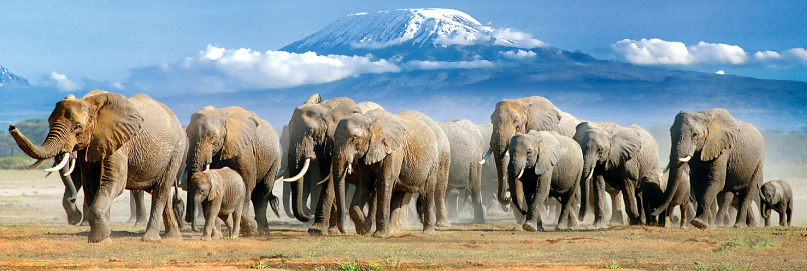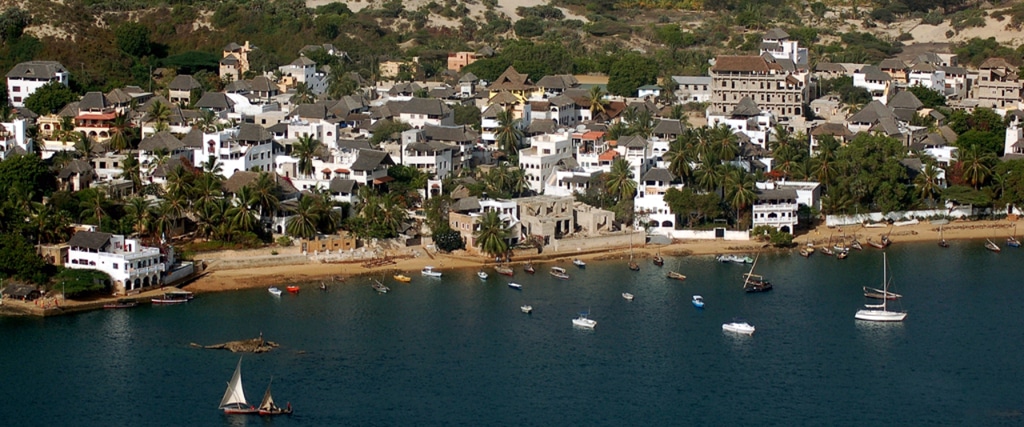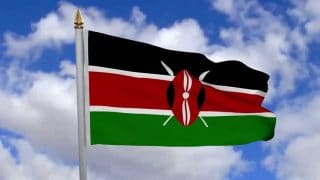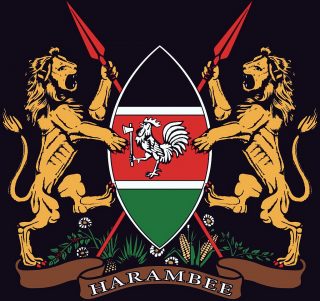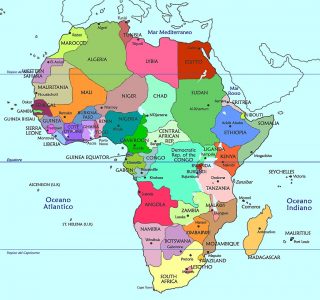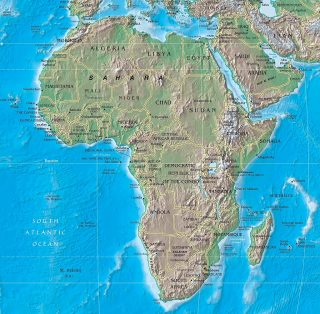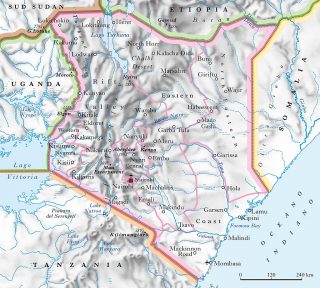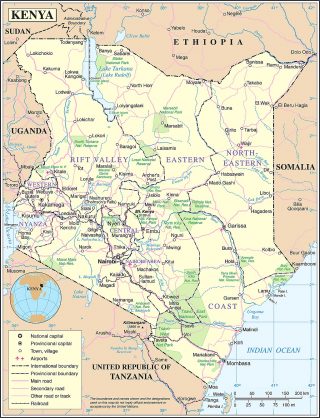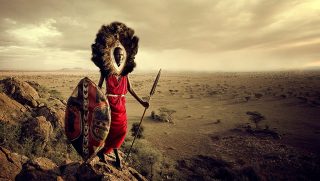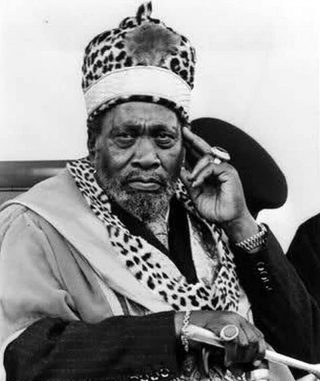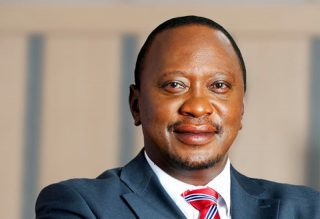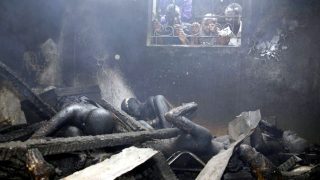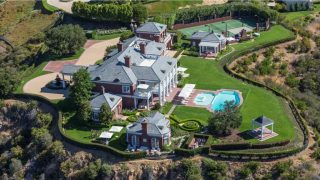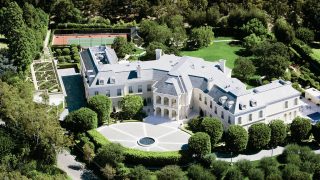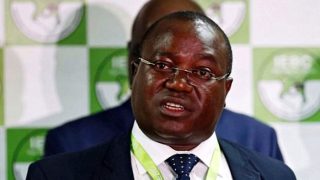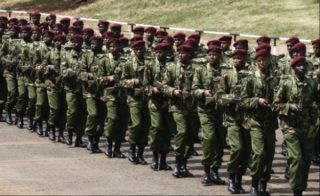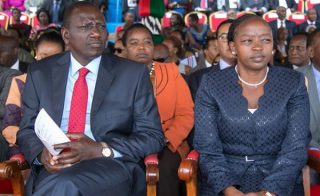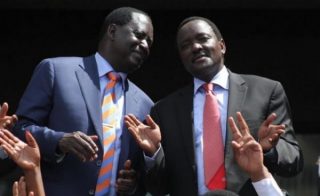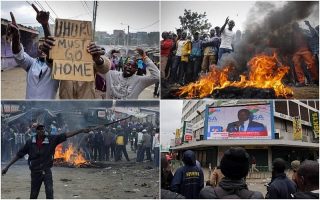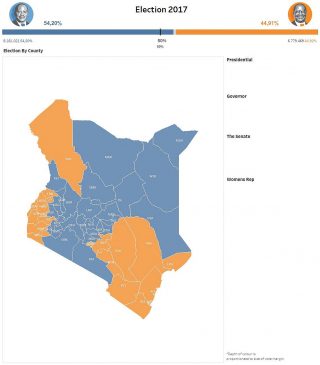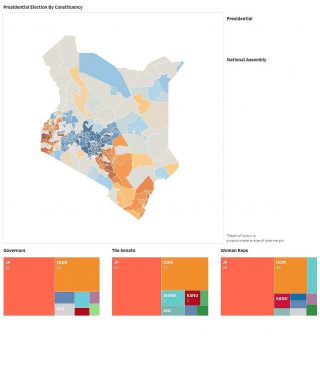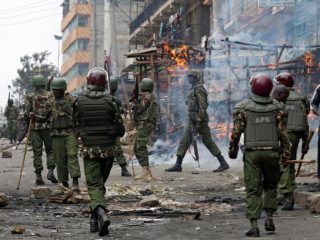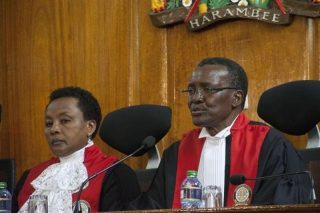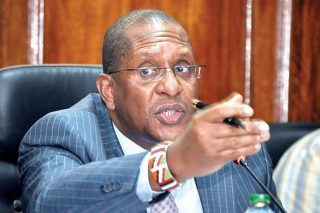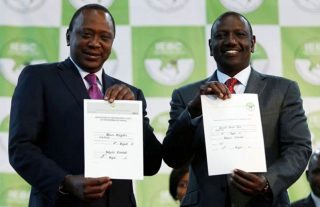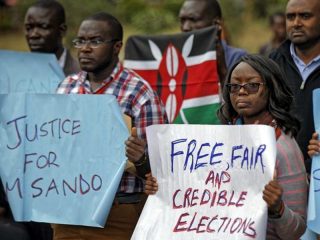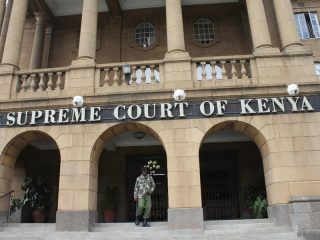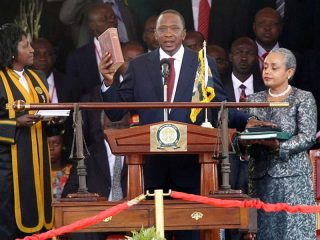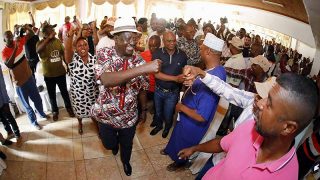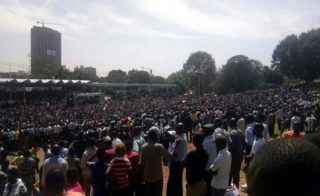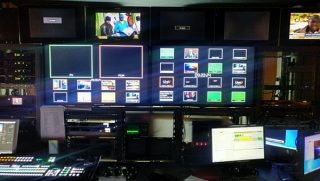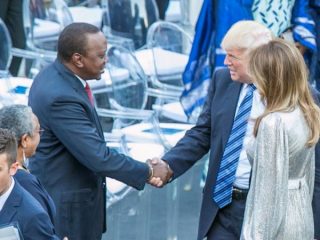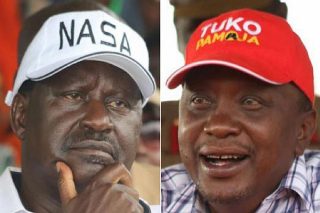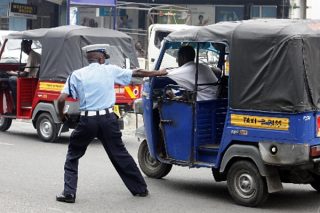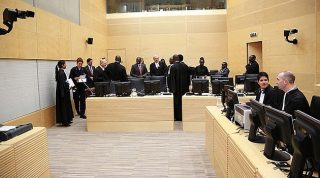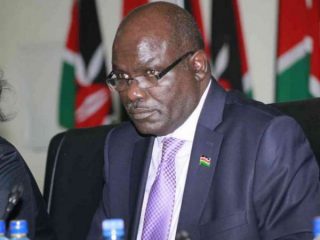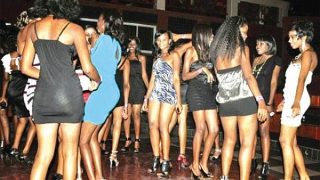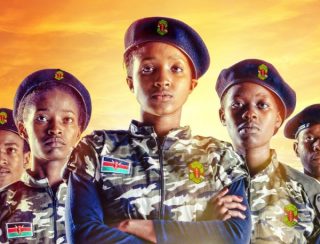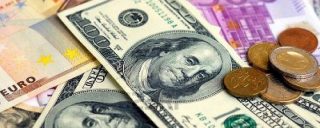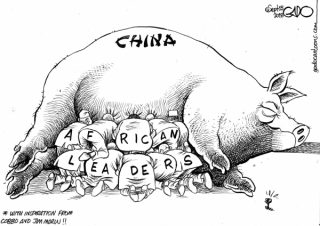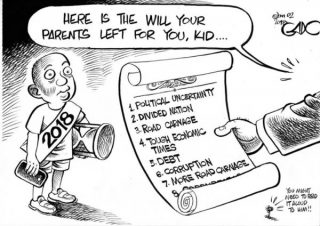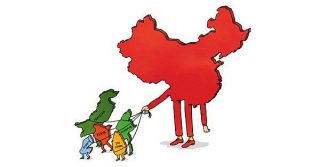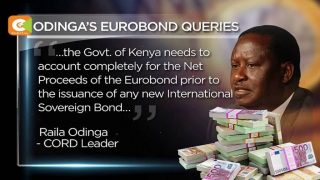Kenya flag
Kenyan flag (Swahili: Bendera ya Kenya) is based on that of the Kenya African National Union and was adopted on December 12, 1963 as the country’s flag.
The black color represents the people of the Republic of Kenya, red for the blood shed during the struggle for independence, and green for the country’s landscape and natural wealth.
The white interleave was added later to symbolize peace and honesty.
The traditional black, red and white Masai shield and two spears symbolize the defense of all the things mentioned above. Note that the black color symbolizes the entire population of Kenya, since black is not a color but the absence of color or the complete absorption of visible light. This means that black indicates all the people of Kenya and not necessarily the black community.
Coat of arms of Kenya
Kenyan coat of arms features two lions, a symbol of protection, with spears and a traditional East African shield. The shield and spears symbolize unity and defense of freedom. The shield contains the national colors, which represent:
– Black for the people of Kenya
– Green for agriculture and natural resources
– Red for the fight for freedom
– White for unity and peace.
On the shield there is a rooster holding an ax as he proceeds, depicting the authority, the will to work, the success and the rise of a new dawn. It is also the symbol of the Kenya African National Union (KANU) party that led the country to independence.
The shield and the lions stand on a silhouette of Mount Kenya which contains examples of Kenya’s agricultural products in the foreground: coffee, pyrethrum, sisal, tea, corn and pineapple.
The coat of arms is supported by a scroll on which the word “Harambee” is written. In Swahili, Harambee means “all united” or “all for one”.
The shield contains the national colors: black, green and red, separated by two white stripes. These are the colors of the Kenya flag and they are also the colors of the Pan African flag.
The traditional Masai shield and the two crossed spears on the coat of arms also appear on the Kenya flag.
The coat of arms appears on all the coins of the Kenya Shilling.
Blazon
It consists of a Masai shield truncated in black, red and green interspersed with silver with a rooster in the center that grabbed a silver ax in the right foot.
Supporters of the shield: two golden lions armed with red spears that crossed diagonally behind the shield.
All on a support, at the bottom, which represents Mount Kenya and which contains examples of Kenya’s agricultural products: coffee, pyrethrum, sisal, tea, corn and pineapple.
The scroll containing the national motto “Harambee“.
Kenya
Kenya is part of East Africa. The total area is 582,650 km² (almost the double one of Italy), of whom 13,400 km² occupied by inland waters. It is bordered to the North by Ethiopia (830 km) and South Sudan (232 km), to the South by Tanzania (769 km), to the West by Uganda (933 km), to the Northeast by Somalia (682 km). To the East is wet from the Indian Ocean along a coastline of 536 km.
The geography of Kenya is quite complex. Kenya is a country in East Africa, and is crossed by the equator.
Despite being an equatorial and tropical country, has very diverse climates. In the North you will find the desert air, and in South-Central Highlands, with woods and savannas. The country is crossed by long chains of mountains.
Altogether, the element that most distinguishes the morphological Kenya’s Rift Valley, which crosses from North to South. The inland lakes are fresh water and salt water; There are also acid fumaroles and geysers heads. Few rivers instead, of which only two have a scope and a notable length (the Tana and the Galana).
The coast of Kenya, along the Indian Ocean 536 km long and has a Southwest-Northeast. The coast is rich in coral reefs (notable ones of Malindi, Watamu and Shimo la Tewa) and sandy beaches in the South.
There are also the Lamu archipelago, to the North, and other islands on the border with Tanzania.
Tana rivers and Galana throw themselves into the Ocean North of Malindi. Along the shores are forests with a rich biological heritage.
The coastline is made up of indigenous land, with strong presences of ancient coral reefs, and with a smooth slope that rises toward the inside.
From the Coast Path climbs rapidly towards the Yatta plateau, that somehow separates the Northern lowlands from the Tsavo region.
The Tsavo is a semi desert area plain, crossed by hills and mountains, which leads monolithic up at the foot of Kilimanjaro, the highest mountain in Africa (which has the Summit in Tanzania).
North of Yatta plateau lie the deserts that converge in the Somali region. Northwest of Tsavo begin the Central Highlands. North what culminates in the Mount Kenya, the second African Summit, and to the South with extensive savannahs and grasslands inhabited by the Maasai.
These plateaus have a variable height from 800 to 3000 metres, with an average over 1600 metres. North of Mount Kenya, the Highlands descend quickly to an area that has significant though semi desert area ranges. Important mount Marsabit.
All along the Rift Valley are mountain ranges. The most important are those of the Mau, Elgeyo-Kaputiei, and those of Baringo.
Some of the highest mountains in Africa are located within Kenya or near its borders. Among them are Mount Kenya, Mount Elgon, the Aberdare Mountains and the Kilimanjaro massif, whose highest peak is located in Tanzania. In addition to these we mount Homa formed by carbonatite lava.
In addition to the ocean along the coast, Kenya controls a small slice of Lake Victoria, the largest lake in Africa. Other inland waterways of importance are the lakes along the Rift Valley, almost all with salt water (Magadi, Elementeita, Nakuru) and often affected by phenomena such as geysers (Bogoria). The release of vapors under strong pressure is common in many areas of the Rift.
Remarkable is the presence of fumaroles in the area of Ol Karia where a thermal power station uses steam to produce electricity. Important Lake Turkana, a freshwater lake fed from the Omo River, from the Ethiopian Highlands.
The only two important rivers are the Galana and the Tana. The Lair was born from the basin along the flanks of Mount Kenya and the surrounding plateau. Then continues northward to bend significantly in the South and the coast. The Galana started off as a small stream from the Ngong Hills, just south of Nairobi and runs around the northern edge of the plain Kaputiei. Here is called by masai Mbagathi. After receiving water from various other small courses, out of Nairobi National Park and is known by the name of Wahid. Follow North and forms the Forteen Falls near Thika. From here it turns South East, keeping close to the entire ridge of the Yatta plateau where it receives the waters of Tsavo and form the Rapids of Lugard. Continues its run up to jump into the ocean, as Sabaki, just north of Malindi.
The coastal strip, more than 400 km, a region of arid highlands and stepposi; the central one, which stands at an altitude between 1500 and 3000 metres, is divided by the fracture of the Rift Valley that extends from North to South and forming the basin of Lake Turkana (or Rudolph). The sides of the Rift Valley rises the imposing volcanic massifs, the eldest of whom is Mount Kenya (5199 m), one of Africa’s highest mountains and Kilimanjaro (5358 m) on the border with Tanzania. The plateau slopes to the West, near Lake Victoria, and to the North where Kenya’s territory is occupied by a vast desert plateau.
Along the coast it has a tropical climate, heavily affected by the monsoon. Inside, under the 1000 m, it has a warm climate with drought conditions and some desert sottoclimi. Over 1000 meters the climate is temperate and continental makes even higher mountains Alpine. The capital, Nairobi, has a temperate climate – the temperature rarely rises above 30 degrees – and cold during the short winter (June/July).
The climate is very hot and humid coastal regions becomes milder and drier in the heart of the country, in relation to altitude. The rains are concentrated in two periods of the year: March to may, while the great rains from October to December rains are intense but short. The dominant environment is that of Savannah, protected by several nature reserves covering about 10% of the national territory. On the slopes of the mountains and along the course of the rivers there are traces of the original rainforest; While in the North, less rainy areas, savanna fades in the desert. The Savannah is the habitat of large herds of herbivores (antelopes, gazelles, giraffes, buffaloes, zebras, elephants) and their predators (lions, leopards and cheetahs). In the waters of lakes and rivers living hippopotamus and crocodiles.
Kenya: ancient history
Kenya is considered the cradle of humanity, thanks to the discoveries made by l. s. b. Leakey and g. l. Isaac, in the area of Lake Turkana, several skulls, including one dating back to about two and a half million years ago. We can say that Kenya is really old if you think that in 2002 in the area of Lake Turkana was found a hominid rest of over six million years.
The Paleoanthropologist Justus Erus Leakey’s team, in 1999 at Lomekwi, Western banks of Lake Turkana in Kenya, discovered fossil remains of Kenyanthropus platyops considered a species of extinct Pliocene Hominide, lived between 3.2 and 3.5 million years ago. The name “Kenyanthropus platyops” comes from Greek and means “man of Kenya” “from the flat face” and was attributed by Leakey to indicate this species, which is also the only known so far for this genre.
The fossil remains found (very deformed) belonging to this new species, consisting of about thirty fragments of a skull very wide and flat face with small teeth. Some paleo-anthropologists the Kenyanthropus could be a variety of Australopithecus afarensis, which lived at the same time and in the same area, or a species of Australopithecus. According to others, the flat face is similar to the finds of Homo rudolfensis, and so would already be an ancestor of the genus Homo. Waiting for further and more significant finds the debate remains open.
Many places are famous to have returned very ancient hominid: Baringo (9 million years), Lukeino (6 million years), Lothagam (ca. 5 million years).
Archaic industries in particular have been found in the Koobi Fora region East of Lake Turkana: the Oldowan industry in KBS site (oldest layers dating to about 1.8 million years); Oldowan industry evolved from, dated to ca Karari. -1.4 1.5 million years. Industries attributed to this phase are also known in central Kenya Chesowanja, where remains of Any robust dated to ca. 1.4 million years.
Levels of different stages of Acheulean are known in the important site of Olorgesailie, ca. 50 km southwest of Nairobi, and Isenya. A Acheulean, associated with human remains attributed to a representative of an archaic Homo sapiens, originates from the Kanjera site. Industries of the Middle Stone Age and Late Stone Age are found, among other things, around Isenya and Hill, near Lukenya in Nairobi. Type upper Palaeolithic complexes, known as Eburriano, are known to Gamble’s Cave, in the central area of the Rift and Drift Nderit, South of Lake Nakuru. Fishing camps dating back to between 5000 and 9000 BC have been found at Ileret, in Lothagam and Lowasera, on the eastern shore of Lake Turkana.
Millennia various populations have emigrated and settled in Kenya. by Hottentots of South Africa to the surface of Somalia, but is in the last millennium after Christ who settled in this area the majority of ethnic groups that gave rise to this wonderful country which is Kenya. By bantu populations the Kikuyu tribe, Akamba, Meru, Gusii and many more, while nilotiche people in Sudan, who moved from the Nile Valley around 1400, the Masai tribe life, Luo, Turkana and Samburu.
The Swahili culture was born here also as in Zanzibar in the same way, because the story was the same. From 700 a.d., Arabs and ancient Persia, Shiraz began pounding the coasts of East Africa, for commercial shipments (See “Zanguebar the land of the Zanj“); as in Tanzania even here many families originated from the Union of ancient merchants with women in Kenya and so was born what is now considered one of the richest cultures of ancient Africa: the Swahili culture. Small towns, State of Islam, with plots of local religions, based on trade in costellarono the coast from Somalia to Mozambique and today we still track well evident in the two islands was once the cradle of civilization: in Kenya, Lamu archipelago in Tanzania and Zanzibar archipelago (See “Kenya from X to XX century“).
Kenya: modern history
The modern history of Kenya is very articulate. In these few lines there will give you only a trace.
The Portuguese arrived in Malindi with Vasco da Gama in 1498. Despite several attempts to secure control of some cities for its trades ranging from India to Europe, the Portuguese were driven by the continuous rebellions of the local population, as in Zanzibar, called in to help the Arabs of Oman, falling down soon from the frying pan into the Fire “.
The Arab presence, in fact, was soon much heavier than the Portuguese, when the Sultan of Oman decided to move to the island of Zanzibar to better control the traffic of slaves, sugar, coffee and cloves, extended across East Africa.
Mombasa and pies (in Lamu archipelago), Swahili City-States, in total rebellion against the Sultan of Oman were annihilated in 1822 but revolts in other coastal areas diminished not.
Legendary was the figure of African leader, known as Mirambo, who around 1870 besieged the Citadel of Kaze, where the Sultan had placed its own settlement and forced him to leave that place forever.
After the abolition of slavery, thanks to a strong boost of English Government in 1873 began the gradual advance English in the lands of Northern Kenya, hitherto inaccessible because of the feared Maasai Warriors. At the end of 1800 the Masai spiritual leader, known as Olonana (known to the British as Lenana), granted to England for permission to build on their territory the current railway line linking Mombasa to Uganda, the infamous Uganda Railway.
This story was shot on film, spirits in darkness, the story of two lions who did not like the construction of the railway line. The fate of the Masai was marked, the myth of the end of the world, he spoke of his own “iron snake” that would have crossed their lands, before their destruction.
Slowly the Masai were relegated to two reserves, separated by the railway line, but were driven out after a few years even from further north, because extremely fertile and were pushed into drier lands to the South; the protests of the Masai leader Olonana, now called Lenana, couldn’t serve for nothing.
The Masai warriors were forced by white settlers in smaller reserves and the tribe of Kikuyu farmers were removed from the land. In the early years of the 20th century, the inner lands belonged to farmers who created coffee and tea plantations on the lands of the Kikuyu tribe, which knew not the land claim in European terms. With the passage of time began to increase opposition to the colonial regime, as Kenya African Union joined other claiming the right to freedom of the people of Kenya. In 1956 the Mau Mau Ribellion was defeated by the colonists with a toll of over 13 thousand deaths in Africa, but it was only a battle victory that snapped off tempers and not the desire to free Kenyans. The December 12, 1963, Kenya finally gets its independence by becoming one of the most stable and prosperous Nations in Africa. Jomo Kenyatta was the first President of the newly independent Kenya. Kenyatta was the political successor to Harry Thuku, an early leader of the kikuyu, founder in 1921 of the East African Association, imprisoned in 1922 by the British, without having committed crimes.
See also: Colonialism
Kenya: contemporary history
Dates back to the years ’30s the beginning of the independence of Kenya, with male, Johnstone Kamau, better known as Jomo Kenyatta, to whom is dedicated the name Nairobi International Airport.
Kenyatta, leader of the Kikuyu Central Association, in 1929 he went to London to seek a peaceful resolution with the British Indian Secretary, but was not even received. The following fifteen years, Kenyatta lived between Moscow, London and Berlin, forming in the art politics and revolutionary action. He founded the Pan-African Federation with Kwame Nkurmah (future President of Ghana) and Hastings (future President of Malawi). In the mid 40’s he returned to Kenya, becoming the leader of KAU, Kenya African Union; Meanwhile, however, in the early 50’s the secret group, known around the world as Mau-Mau, consisting of Masai, Luo and Kikuyu with which began the revolution Mau-Mau. Kenyatta, though unrelated to the movement was soon arrested for nearly seven years. After various repressions and openings of the English Government finally in 12 December 1963 we came to independence of Kenya under Jomo Kenyatta, who tried to start a policy of equity and redistribution of land. Kenyatta ruled until his death in 1978 it.
After Jomo Kenyatta’s death in 1978, rose to power, becoming the second President of Kenya, Daniel Arap Moi from the tribe of the Tugen. Moi ordered the dismemberment of the University and the dissolution of tribal societies. Under the new Government internal tensions had a new intensification, the Kenyan Air Force, with its aviation Division in 1982, attempted a coup d’état but failed because the military apparatus loyal to President Moi had the best, dismantling the air force.
International aid in favour of Kenya headed by President (dictator) Moi were stopped, then the IMF (International Monetary Fund) asked Moi to loosen the stranglehold of political oppression in place and more democratic behavior in respect of the people of Kenya, Kenya would in return had again international aid. Daniel Arap Moi accepting the “conditions” of IMF won re-election in 1993 and also those (much discussed) of 1997. In the 2002 elections, former President Moi from 24 years, tried to change the Constitution in order to reapply, but managed, then was elected President Mwai Kibaki, causing a profound change of Government policy and introducing of new democracy in Kenya.
March 26, 2013
Uhuru Muigai Kenyatta, former leader of the political party Kenya African National Union (KANU), the former single party of Kenya, and son of Jomo Kenyatta and Ngnina Muhoho, the father of independence of Kenya, was appointed President of Kenya.
Although called by the second President of Kenya, Daniel Arap Moi, to be his successor at the helm of the KANU presidential election on 27 December 2002, Kenyatta suffered a heavy defeat by the coalition of opposition parties led by Mwai Kibaki. Although KANU had held the power in the 39 years after independence, got only 31% of the vote against 62% for Kibaki. Some analysts have emphasized his closeness to outgoing President Moi as a cause of defeat. In January 2005, Uhuru Kenyatta defeated Nicholas Biwott for chairmanship of KANU, 2,980 votes obtaining by party delegates against 622 votes in favor of Biwott, consolidating his position as President and leader of the KANU and the opposition.
Today, Kenya is one of the most viewed countries of Africa, in strong recovery, on which the whole world community is focusing a lot, including the Italian Government, given the recent 2009 funding, to Italian investors in Kenya. Much is being done and will be done again and it is no coincidence that tourism is more each year in total: one of the most beautiful parks in the world, breathtaking beaches and an extremely hospitable and friendly population, can only help the tourism economy.
January 29, 2016
At 18 months from the next election, the landscape is likely already to be explosive, in Kenya. Especially the Rift Valley is not expected to bubble up. A fragile ecosystem and extremely valuable whose composite attractiveness has made over the years also an unstable political cauldron, no stranger to moments of extreme violence and of vital importance for any candidate in the elections. Especially since, in the coming months, there will be at least 1.5 million registered voters.
This wide earth fissure houses a multifaceted agricultural scenario, labor force call for the entire state. Here, along the shores of Lake Naivasha, it is produced 137,000 tons of roses that literally flock to the European and Asian cities, with environmental and social consequences are not always positive. But it is also a stretch out of sight of tea and coffee fields. Its geothermal power plants, then, provide Nairobi cheap electricity; its water lakes. No wonder, then, the huge influx of migrants who have made, in fact, this area a colorful human kaleidoscope, dominated in particular by the Kikuyu and Kalenjin. A key constituency that Uhuru Kenyatta, the current president of Kenya, he needs to win if he wants to be re-elected next year.
Kenyatta belongs to the Kikuyu tribe, the largest in the country, and his victory in 2013 it was partly due alliance with William Ruto, a very popular politician among the Kalenjin. But today, with galloping inflation, the economy moves back and Ruto on trial by the International Criminal Court in The Hague on charges of incitement to violence after the disputed 2007 elections, every scenario is possible.
Between the end of 2007 and the beginning of 2008, after the elections, Naivasha and Nakuru were devastated by terrible brutality sconquassarono Kenya with over 300,000 displaced and at least 1,300 people killed. Many of Ruto supporters wonder, today, because he is still in the dock while the charges against President Kenyatta have fallen. In fact, the Hague International Criminal Court formally closed in March of this year the case against the incumbent president Uhuru Kenyatta, the first head of state in office to appear before Hague judges. In 2011, Kenyatta was accused of having played a role in the atrocious violence that erupted after elections in 2007. The case, one of the most discussed and criticized in these 13 years, was dropped for lack of evidence, but it has not helped fuel little the myth of the “African prejudice.”
Among the protagonists of the campaign in favor of Kenyatta was reported Ugandan President Yoweri Museveni, who does not hide his intention to reach a mass withdrawal by African countries by the Rome Statute. The motion has already been addressed in two different summit of the African Union, however, lacking a quorum thanks to the commitment of countries such as Ghana, Côte d’Ivoire, the Democratic Republic of Congo. Politically, however, the “damage” had been done, and what happened in South Africa in favor of Bashir confirms that the effectiveness of the International Criminal Court is at risk. Africa, however, is among the major “shareholders” of the Court: of 123 countries that have signed the Rome Statute, as many as 34 are African. And Africans, in hindsight, are also half of the ongoing conflicts in the world, perhaps one of the reasons why no secondary Hague gaze has settled so often on the black continent. Another reason, say some analysts, is that, being so exposed to violence, African civil society has had particular interest in recent years to establish a state of law, including the rectum from the outside if necessary. “Requirement” but it is felt less by heads of state, especially by those who tend to see themselves above the rules that require them to respond legally for their actions. If you add to this the extreme slowness of action demonstrated by the International Criminal Court (also for lack of higher operating means), here it is that the Court does not enjoy good image and its very existence is now under discussion.
What is certain though, it is that if Ruto should be condemned, its alliance with the current president could be jeopardized by opening the way for other possibilities. Moreover, Ruto is not the only representative of the Kalenjin: Gideon Moi and Isaac Ruto, a governor of the county, for example, are two potential challengers. In a scenario yet to be defined and which could, again, be explosive.
April 7, 2017
KENYA 6th MOST CORRUPT COUNTRY IN THE WORLD, 1st IN AFRICA
Kenya is the most corrupt nation in Africa and the sixth country in the world on this special and improper classification of bad habits, compiled every two years by the American EY Fraud Survey.
Generally, the country of East Africa has gained a position, confirming its position within the top ten for six years, but has passed Nigeria, Somalia and Congo in the continental ranking, becoming Africa’s most corrupt country, thanks largely to all ‘Increase its business turnover.
In the special statistical dell’EY Fraud Survey, in fact, also it counts the volume of transactions in which they occur fraud of all kinds (from those tax to the real “wads”, from extortion smuggling, from speculation to concessions) and not only habits and opportunities.
Such a ranking is certainly an aid to the Government’s Opposition, in view of the upcoming elections. In fact, the fight against corruption was one of the flags of President Uhuru Kenyatta during his mandate, which expires this August in August, only getting this plague going to mining any institutional setting at every level. The current television presenter, during the establishment of the new Chief of the Judiciary, wanted to believe that he had his hands tied to the phenomenon of corruption, because the power to deprive the corrupt is exercised primarily by Parliament, thus obtaining All over the country, anti-corruption demonstrations are suppressed by the police by forgetting the soft manners, with the consequent rooting of the general “eat-eating” in any environment, even among the poorest people who inevitably fail to understand, given the intellectual, Which is simply destined to remain so.
For this very reason, citizens will renew with the vote the mandate of today’s President!
July 18, 2017
THE VIDEO PROPAGANDA AGAINST RAILA ODINGA
The propaganda video that appeared on the Internet last week has generated many reactions. In Kenya, at three weeks of legislative and presidential elections, such a spot fears the explosion of new violence.
The 90-second video, anonymous, is “The Real Raila” and says “Stop Raila, saves Kenya. The future of Kenya is in your hands” and assumes a country in chaos after the opposition’s victory.
Uhuru Kenyatta, outgoing president, along with his deputy, William Ruto, appears to the presidents. Both have been investigated by the International Criminal Court for their alleged involvement in the 2007-2008 electoral violence.
Kenyatta, headed by polls, will once again challenge Raila Odinga, leader of the Orange Democratic Party and National Super Alliance, which brings together the various parts of the opposition.
Generally, the country of East Africa has gained a position, confirming its position within the top ten for six years, but has passed Nigeria, Somalia and Congo in the continental ranking, becoming Africa’s most corrupt country, thanks largely to all ‘Increase its business turnover.
“The Real Raila” is one of the many online propaganda warfare tools used by its rivals. It’s clear who is behind the “slick video” Pro-government that has spread it. Other elaborate, targeted and well-oiled bloggers in Facebook and Twitter campaigns said they were funded or connected with Uhuru Kenyatta and his Jubilee Party.
August 1, 2017
KILLED AN ELECTORAL COMMISSION MANAGER
A Kenya Electoral Commission’s Manager (IEBC) was found dead at a week’s general election on August 8th. The body of Chris Msando has been identified as a prison in Nairobi, IEBC President Wafula Chebukati told the press. «There is no doubt he was tortured and killed. The only question left is who killed him and why», Chebukati said.
The official worked on the integrated electronic control system (IEMS) for the identification of those entitled to vote, which would almost cancel the electoral fraud. This is a move by the IEBC that triggered an intense legal and legislative battle by “soliti corrotti” on the use of an electronic system as opposed to manual identification of voters, a battle that ended in blood, “as is normal”, with the assassination of the manager.
Chebukati announced the cancellation of such control after Msando’s killing.
Msando’s body, which was missing an arm, was found in a grove near Kiambu near the capital, next to a 21-year-old friend, Caroline Ngumbu of Gachie, Kiambu County, who had just completed studies At Kenya Medical Training College, Karen Campus. A witness that was to be eliminated. Both were naked.
The IEBC had previously indicated in a statement that Msando had been seen Friday night and Saturday morning he had sent a message to a colleague saying he was fit and ready to face the challenges of the day.
Unrepeatable anonymous comments about the two victims appeared online, and in part canceled, in various news headlines.
Kenyan President Uhuru Kenyatta was said to be “deeply saddened and shocked” by the killing of the head of the High Tech Department of the Kenyan Electoral Commission. “Chris was a man who devoted himself to the service of the country and its institutions”, said the Head of State, who has appealed to facilitate the work of investigators. “Speculations could make their work harder by adding to the pain of the people who loved him”. This “is not the time to allow a tragedy to divide”, said Kenyatta referring to the upcoming general elections scheduled for August 8.
Msando had been last seen last Friday, a day when his car was found abandoned in a parking lot in Nairobi. Msando was driving the launch of the new electronic system to use to identify voters during the upcoming elections.
Kenyan opposition called Msando’s murder a “stab” that led to the free elections. As reported in a statement by the main opposition force, the National Super Alliance (NASA), “no effort has been made to make an accident appear to be killing”, demonstrating that the mandates “will not stop in front of anything to ensure the result they want”.
The main challenger of current President Uhuru Kenyatta will be former Raila Odinga, 72, who was already nominated in 2013 when he obtained 43.28 percent of votes against 50.07 percent of Kenyatta’s preferences. In the chairmanship Odinga will be accompanied by former Vice President Kalonzo Musyoka.
It would be false to argue that premeditated murder is not part of Kenya’s policy.
There has been a significant political assassination under every leader in Kenya’s history, not to mention a model of extrajudicial executions dating back to colonization.
The toxic policy that led to the killings of political enlighteners such as Tom Mboya, JM Kariuki, Pio Gama Pinto and Robert Ouko, as well as electoral violence in 1988, 1992, 1997, 2007 and 2013, is more than ever current.
August 2, 2017
The autopsy, conducted at Lee Funeral Home in Nairobi, revealed that Christopher Msando died of strangulation.
Moses Wetang’ula, Senator of Bungoma County and leader of Ford Kenya, said: “I have been a lawyer for many years in this country and abroad. I’ve been dealing with many cases of murder and I have seen many bodies of people killed, but I have never seen the body of a person who was tortured and killed like Msando. I tell my people that Msando was assassinated as an animal. Seeing her body was nothing short of shocking and the facts clearly suggest that her killers were looking for a password to get to the IEBC computer and manipulate votes. “.
August 7, 2017
Tension in pre-election day, exchange of accidents between the two schieraments
High tension remains in Kenya on the eve of the presidential election that will be held tomorrow. Both the American and Canadian embassy confirmed that the two North Americans, arrested last Friday, were expelled from the country, but did not provide any details.
The same fate has also been to the two Ghanaians who, according to Senator James Orengo, were part of the group of experts invited by NASA to provide their assistance in monitoring the electoral process.
As revealed by the immigration authorities this morning, the reasons for the arrest and the consequent deportation concerned entry visa irregularities as the four had entered Kenya as simply tourists and therefore, as such, it was not they are allowed to engage in any type of professional activity. This decision, though formally impeccable, has appeared excessively and exclusively aimed at disturbing the pre-electoral activities of NASA.
Last Saturday, Orengo, in the meantime, revealed in surprise that the fifteen incursors that a few days ago broke into the NASA headquarters devastating him would be identified as bourgeois police agents. Of them five of them also made the names. These would be Chiefs Charles Ndugu, Leonard Barongo, Lindon Nyaga; Sergeant Richard Serem and Chief Inspector Francis Kimemia. From names it would seem to be just kikuyu, ethnicity of President Uhuru Kenyatta.
A few hours later, the Nairobi police spokesman, George Kinoti, however, severely denied the news, ruling out that such an outbreak had ever occurred and liquidated it as a mere propaganda find of the opposition party. “How is it – was the police officer asked – is this raid, if it really happened, never been reported to law enforcement?”
The allegation of alleged breaches has provoked lively reactions to opposing deployments. Raila Odinga’s supporters shout at the scandal by serious manipulation of the results of the vote, while those in favor of the outgoing president, Uhuru Kenyatta, swear lazzi on the pathetic attempts of the opposition to pick up the elector’s favors with the continued use of fandonies.
However, day after day, the country is approaching the vote in a more and more glowing atmosphere with the record that continues to report events, whether true or presumed, anything but favorable to establishing a peaceful and confident climate on the genuineness of the outcome of consultation. To add even more apprehension, news has come that the police of Kisumu, County where the heart of the supporters of Raila Odinga has gathered, received large quantities of first aid material, including hundreds of corps recovery and Although the local Security Officer, Wilson Njenga, has overturned the fact, attributing it to a normal preventive practice, carried out in collaboration with the Red Cross, the spread of this initiative has nevertheless created great concern among the public.
Yesterday the election campaign was closed and today, on the eve of the vote on Monday 7, must be a day dedicated to meditation and silence so that everyone can serenely prepare for the democratic duty to elect whom to represent and guide the country over the five years to come. From all over the world, Kenya exhorts to calm and peaceful acceptance of the result.
by Africa ExPress
August 7, 2017
William Ruto, the most corrupt man in Kenya wants to reconfirm to Vice President
William Samoei arap Ruto, Kenya’s vice president, is back in Uhuru Kenyatta’s rows to regain his armchair.
Ruto was born in 1966 in the Uasin Ghishu County, fief of the Kalenjin, one of the largest ethnic groups in the country, from a family of modest origins. Since childhood he has always been a brilliant student. He graduated with the highest grades in biology and zoology, and for several years he earned a living as a teacher, before embarking on political career.
In 1992, he launched a policy with “The Young People for Kenya African National Union” (KANU), the party of Daniel arap Moi (arap means a kalenjin child). Young Ruto was a frequent visitor to the African Inland Church (AIC) and in the university years he was also the leader of the University Christian Union choir.
His first encounter with Moi happens randomly during a religious function: the then president had been hit by a prayer recited by Ruto. Today, the vice president is a wealthy man, but sources of his native village say that he was selling chickens and peanuts on the Nakuru-Eldoret road for a young man to contribute to his family’s low budget.
During the 2007 elections Kenyatta and Ruto were busy on different fronts. The former was then a faithful president of the time, Mwai Kibaki, while the latter supported Raila Odinga, now rival of Ruto, and candidate as president in this election.
Both Kenyatta and his deputy Ruto were indicted by the Hague International Criminal Court for crimes against humanity, committed during and after the presidential elections of 2007, other considered to be rigged by the international community.
There were a thousand deaths in tribal clashes between the supporters of one and those of the other, which were then on opposite sides. But as is often the case, the trial was set aside for the withdrawal of witnesses. Many believe that witnesses have been bought after the strange deaths of some of them. In addition, in 2013, during a summit in the African Union, many countries threatened to get out of the ICC, classifying it as “racist and prejudicial attitudes towards Africans.”
Ruto was the first vice president in the history of the former British colony to be elected directly by the people; Functions and powers competing for this role are set by the Constitution. The vice president must also perform the tasks entrusted to him directly by the president and support him when necessary to be able to govern with serenity.
Just under a year ago, the Infotrak, company that deals with social research and statistics, has classified the Ruto office as the most corrupt ever, while the President is the second in this sad ranking. Sixty-two per cent of Kenyans are convinced that they have not chosen the best party during the 2013 elections, while fifty-five per cent are not satisfied with the country’s economic performance.
William has a great charisma and is a great speaker, as well as being an excellent team leader. He is married to Rachel Chebet Ruto, known during college years, who has given him six children, including a non-biological daughter, Nadia. The wife comes from a family of poor peasants; Rachel first wore a pair of shoes when he was admitted to secondary school. Ruto is painted like a great family father, and follows the children’s education carefully.
by Africa ExPress
August 7, 2017
Kalonzo Musyoka, runs with Raila:
the man of the umbrella and half orange
“Wakati ni sasa” (The time is now). It comes with a simple slogan, perhaps a bit banal Kalonzo Musyoka candidate to Kenya’s vice president, along with candidate president Raila Odinga. Musyoka, class 1953, is the party man with the umbrella, the Wiper Democratic Movement (WDM). It is Kamba ethnicity, about 4 million people living in the eastern part of the country and account for almost 10 percent of the Kenyan population.
Long-term politician (has been in parliament since 1985), Musyoka was Kenya’s vice president from 2008 to 2013 and in government during the dictatorship of Daniel arap Moi. Between 1986 and 2002, under the full moon regime, he was Minister of Foreign Affairs, Education Minister and Head of the Tourism and Information Department.
With the presidency of Mwai Kibaki, the first after Moi, he was entrusted with the Ministry of Foreign Affairs and then with the Environment. After defeating the 2007 elections, Kibaki appointed him as Vice President in January 2008, entrusting him with the Ministry of Interior.
The Wiper Democratic Movement is the evolution of the Orange Democratic Movement-Kenya (ODM-Kenya), which in 2007, four months before the election, had separated from the Orange Democratic Movement of Raila Odinga. Odinga’s party symbol is the orange that Musyoka has resumed but cutting it in half.
It did not bring luck to him: only 9 percent of the voters’ consent that had a lot of confusion between the choice of the whole orange and its half. For a part of her former party colleagues she was illiterate for others a betrayal.
Perhaps at this point, the only alternative could only be an open umbrella. In past political elections, the WDM, with almost 880,000 votes, entered parliament by winning 25 seats out of 349.
In this election campaign, the Wiper Democratic Movement presents itself with the National Super Alliance-Nasa, a coalition of five opposition parties, the most important of which is the Orange Democratic Movement.
by Africa ExPress
August 11, 2017
Kenyatta reconfirmed president of Kenya
Uhuru Muigai Kenyatta was officially re-confirmed as Kenya’s President for his second mandate expiring in 2022. Vice President William Ruto was also re-affirmed.
The proclamation of the winner was announced by IEBC, the Electoral commission of Kenya, well over 22, when the president, Wafula Chebukati, he has revealed the decision which his institute received after a thorough examination of the results and announced the renewal of the presidential office at Uhuru Kenyatta which, with 54.20% of the votes (8,181,021), defeated the rival Raila Odinga which totaled 44.91% (6,779,469).
In Malindi: Uhuru 23.4%-Raila 75.62%.
The Reuters agency reports that only Mathare, Nairobi pro Raila Slum, has risen to 10 deaths, including a young woman and a baby girl who was facing a balcony, due to “sporadic shots” shot by Police during clashes with protesters against the results of the presidential election. Three people were killed in Nakuru County during the celebrations that followed the re-election of the president.
Kenya’s Human Rights Commission said it had counted 24 dead in protests that broke out in the opposition strongholds after Tuesday’s election, but the opposition speaks of the deaths of “a hundred people and 10 of these children.”
August 14, 2017
Calm in Kenya.
Raila resort to the UN and civil society to the Supreme Court
Quiet day, today, and without significant violence throughout the country, including the Nairobi slums and the Kisumu area. The strike to which Raila Odinga had called her supporters yesterday was a partial success, but only in the capital of the capital. Many exercises have resumed the normal activities everywhere, although some have remained closed by causing a return of violence.
Uhuru, today, made his first public appearance after the vote when, with a massive car and motorbike deal, he went to the Harambee House in Nairobi. His irreducible opponent, Raila Odinga, instead appealed to the United Nations, requesting their intervention for a thorough investigation of the electoral mechanism. According to what he has repeatedly stated, he believes he has been tampered with by political opponents. NASA’s leader also reiterated his total misgivings to both the Electoral Commission and the Supreme Court, in his view, both controlled by Uhuru Kenyatta. He then reiterated the disappointment on the work of international observers, especially the American ones led by John Kerry, for the superficiality with which they conducted their checks on the work of the IEBC.
On yesterday’s day there was also the mysterious suicide of Orenge NyabichaIn yesterday’s day there was also the mysterious suicide of Orenge Nyabicha, a high official of the IEBC (the Kenyan Electoral Commission) that left a note in which attributed the extreme gesture to the moral impossibility to share the fraud implemented by the body of which it was part. Death would have been caused by a deliberate carbon monoxide intoxication in the fumes of a kerosene stove found in its housing by investigators. The spread of this news has triggered many opposing reactions on social networks. The supporters of NASA read a tragic confirmation of the fraud, while those of the Jubilee, blame the opponents for having created a staging that corroborate the thesis of the plot to their damage.
The inhabitants of Mathare and Kibera, have also denounced violent raids against them by groups of Mungiki (the sect Kikuyu, outlaw, which is identified in the independence movement of the Mau Mau). Other events confirmed by the same police authorities who continue to patrol the most threatened areas in force, reaffirming that he had never made use of real ammunition and attributing the death of the nine-year-old girl, struck yesterday on the balcony of the house, to the weapons in possession of the demonstrators.
Lucky Summer residents, a Nairobi slam, supporters mostly by Raila Odinga, told Africa ExPress that some of the apartments have been devastated today by armed robots of machete (which are called panga) and knives. “They wore military uniforms but were not military. Some had their hair with the dreadlocks (the particular knots using Rasta, ndr)- says George Otieno- They could not be soldiers. They were the Mungiki”.
It is difficult, even for the most accurate of chroniclers, to unravel between the false and the truths set out by both opponents and it is therefore not to bring back the statements of one and the others, without any possibility to disprove them or Avvalorarle. It is certain that everything is meant to be understood that the question of voting, despite the peace that now seems to reign in the country, is far from resolved. Raila Odinga claims to have been robbed of victory for the third time and is not willing to tolerate the abuse, although he does not intend – he ensured – to apply again to the presidential office.
However, if the candidate defeated, he does not intend to resort to the Supreme Court of Kenya, he announces that he wants to do it tomorrow, in his capacity as the Kenya Civil Society, a non-governmental institution that protects law and legality Against any act – both public and private – which is guilty of these principles. The petition, if presented as promised, is likely to slip the sworn oath for tomorrow’s newly re-elected President Uhuru Kenyatta and his deputy William Ruto.
Tomorrow Raila Odinga has summoned a press conference tomorrow (time and place will be announced at the last moment for security reasons) in which he will announce the moves he intends to take “to reverse a shameful electoral outcome”, are his words.
by Africa ExPress
September 1, 2017
Kenya Elections canceled, the vote within 60 days
The Supreme Court of Kenya canceled the votes for the Presidency of the Republic that were held on August 8, 2017. A new election round will be held cavern 60 days. There were serious irregularities, they established the judges. Hence the decision to invalidate the results.
The Supreme Court has accepted the petition submitted by NASA. With this ruling, reached by four votes on six, the supreme judges implicitly acknowledge that Raila Odinga was right: the electoral results of 8 August were manipulated to its detriment. They explode the festivities among its supporters, in the silent bewilderment of those of the opponent Uhuru Kenyatta and shines on all the shameful embarrassment of international observers who hastily placed their imprimatur on the correct Conduct of the electoral process.
It is the first time that a court in an African country cancels the presidential elections.
by Africa ExPress
September 25, 2017
More and more bleak the future of Kenya.
The election commission is under investigation.
The second electoral session postponed.
Kenya risks chaos.
Although they all talk of nonviolence and peace, everyday events happening in the country blatantly contradict these intentions. Kenya’s Attorney General Keriako Tobiko has opened an inquiry into the IEBC (Independent Electoral Commission) suspected of manipulating the August 8th results to favor the outgoing President Uhuru Kenyatta, who, for his part, had already some days before, accused the Supreme Court, called “Gang of crooks”, of having executed a coup, canceling the electoral outcome, to bring Raila Odinga to power.
While on the order of the Public Prosecutor’s Office the police and the Anti-Corruption Authority initiated investigations into the commission under investigation, there was an announcement today that the chief of police, William Saiya, was removed from office and replaced by Noor Cabow, which measure is to ensure a more transparent conduct of the vote, which, from the original date of October 17, was moved to October 26.
There is no need for an intellectual record quotient to conclude, at least according to what was stated at the time of this nomination, that if Noor Cabow is expected to provide guarantees for “a more transparent voting”, this means that the boss removed, William Saiya, such guarantees could not provide them.
Raila Odinga, however, continues to recall that “with this corrupt and factional electoral commission” he does not intend to go to the vote. Another alarming thing was reported a few hours ago by the local press. Geoffrey Mosoku, of the Standard Daily, reports that the police, probably following the recent order of the General Prosecutor’s Office, intercepted on Tuesday evening a truck with two hundred thousand bags containing election documents of the IEBC that were to be transferred from the Commission headquarters to a private residence.
The police, suspicious of the numerous travels made by the truck driver, between the IEBC headquarters and the family house, blocked the vehicle and once found the content, put it under seizure. Mr. Omondi, owner of Hopeland Advertizing & Design Ltd. intervened on the site of the sequestration explaining to the investigators that her firm had been contracted by the IEBC with a tender of about seven hundred thousand euros for the distribution of electoral material and that the storage of the material in that residence was only a necessity of space.
However, this explanation did not satisfy the investigators who kept the vehicle under seizure by noting that there was no formal authorization for that transfer to take place at a private residence and that, however, as sensitive documents, that transfer should have taken place with an escort it would guarantee its safety.
Following last week’s demonstrations, promoted by the Uhuru Kenyatta Jubilee, which have created gazzarre in various parts of the country and particularly in front of the Supreme Court gates in Nairobi, with open threats to the judges who compose it, yesterday there was ‘Another tribal massacre in Narok between the Masai and Kipsigis communities, both of the niloty ethnic groups. There were seven dead in the field. These are two tribes dedicated to sheep-farming, which have always been antagonists for access to the pastures. The clashes would therefore be the result of atavistic rivalries, not politically motivated, as well as the decapitation of three military kenyans by Al Shabaab in the somali village of Jillib where the hapless kenyans were detained.
All these dramatic events, whether or not connected to the controversial political issue in question, play a deprecating role in creating a sharp sense of instability and insecurity both in the local population and in foreign investors. If this is accompanied by the increasingly precarious situation of the state budget, it follows that Kenya is likely to have to pay long and painful effects, especially at the expense of its most indigent citizens.
by Africa ExPress
October 30, 2017
THE VOTE WAS NOT CLEAR, BUT KENYATTA WAS RE-ELECTED PRESIDENT OF KENYA
At 18.07 today, with the usual endemic lags behind the appointed hour, the president of the Electoral Commission (IEBC) Chebukati Wafula, he has again claimed victory in the presidential race Uhuru Kenyatta Jubilee alliance. If there were a Nobel Prize for the art of creating confusion, Kenya could run for the podium with strong hopes of victory.
Since the vote on August 8 the information provided to the public by the relevant institutions, have been marked by a welter of allegations, denials and restatements: “The elections are valid, the election is invalid and must be belittling; The new election will be held on October 17, the new election will be held on October 26; Raila withdraws his candidature, Raila (perhaps) does not withdraw, Raila confirms that withdraws; In polling stations where it is not voted on October 26 it will vote on October 28, in seats where you do not vote, do not vote anymore … “
The image that Kenya is providing an image in the world is totally disappointing. It has not been able to organize an efficient safety system that would guarantee the exercise of the right to vote and although it paid a high cost in human lives. The management of the electoral process, although in preparation for over a year, has not been able to provide clear and objective evidence, topped by the usual wrong card mess, material posted in different seats from those they were intended and various delays in supplying.
But what creates the most confusion is that the Supreme Court, in decreeing the cancellation of the first results, has been unable (or unwilling) to clearly explain to the public the reasons for the cancellation, nor who was responsible for the irregularities. After all, that the Court’s attitude has been characterized by shyness a little ‘suspicious, it was confirmed the 25th, when it managed to resolve on the petition calling for a postponement of the elections because five out of seven members were absent. The reasons? Who had missed the plane, who was too far away, who was not feeling well …
Uhuru Kenyatta is now formally authorized to rule. But with the country split in two, and with too much dust under the carpet, it will have enough strength to hold together the two opposing factions? Because the point is just that. If Kenya will have to move towards the goal of social and economic emancipation, which he desperately needed, certainly can not do so in a climate of permanent conflict that supporters of NASA promised. Perhaps the solution might actually reside in the coalition government proposed by Raila Odinga. Of course, this is not a solution that fully satisfies the parties, and is not even a fairly objective solution, but African democracy stands still on a balance that is still very different from the Western ones and here the common good has yet to prevail over personal rights. are well defined and verified, which in this case still leaves many doubts.
Kenyatta formally won. The result was also granted after the defection of NASA from voting. Tomorrow Kenya, he will lick the wounds and many will attempt to resume his normal pace of life, it will not be easy because the tensions are far from dormant. After all, for no country in the world it would be easier to accept an election result produced without the participation of four whole counties. It would be like a party in Italy conquered the power, despite the fact that four provinces were unable to vote. Finally, a turnout of only 30 percent of members voting, it certainly limits the representation of who has the difficult task of governing. The coming hours will tell us whether the long agony suffered by the country in recent months is really over.
by Africa ExPress
November 4, 2017
AGAINST THE RAILA GOVERNMENT ANNOUNCES A BOYCOTT OF THE ECONOMY
In his statement yesterday, the NASA, the Super Alliance headed by Raila Odinga, defeated for the presidency of Kenya, announces the start of the economic boycott already proclaimed in recent days. They are heavy measures that, if adopted by his supporters, will not fail to inflict on the country another economic deadlock with unforeseeable consequences. Especially considering the fact that this morning the government launched a request for a loan of 300 million euro to complete the last section of the new railway will reach Kisumu.
On this occasion, the NASA reiterated that the aim of the coalition, now converted into “Resistance Movement”, is to “put an end to the autocratic regime that has been established with the appointment of Kenyatta as president, to return the country to democracy through free, fair and credible elections “ . It was stated that, to achieve the result that is proposed, the move will result in peaceful demonstrations and attitudes “uncooperative with a government that – according to them – seized power illegally” .
One of the measures adopted by NASA, will be to boycott certain large industrial and commercial groups that would be colluding with the “regime.” “We have a long list of companies, – specifies the press – local and international, to notify you from time to time to the population so that it can implement the boycott” . In a statement yesterday, the NASA has already shown the first three: The Safaricom, the Brookside Dairies and The Bidco Inustries, ensuring that these will follow soon other so that citizens are properly informed of their wickedness and because, together with the government they too have “hands stained with innocent blood”. The companies in question are substantial shares held by Jubelee alliance members. In the case of Safaricom, corporate control is in the hands of Uhuru Kenyatta government.
Hard to predict how many will follow the instructions of NASA, as it comes to companies with large-scale distribution of services and products that will not be easy to replace with equivalent valid, but it is certain that disruptive action, these measures will undoubtedly it will create and although, five days after the reconfirmation of Uhuru Kenyatta, in the country there have been riots and violent demonstrations, the intentions of the NASA do not fail to create some apprehension, because the political atmosphere is anything but serene and every day we hear news of confrontations, threats, complaints, even within the same opposition alliance.
For its part, the UN, speaking through a spokesman, Stephane Dujarrik, commended yesterday Roselyne Akombe, prominent member dell’IEBC (Electoral Commission), to be returned to Kenya and regaining the position it held prior to that, all considered, fleeing to New York to protect their own safety at risk from serious threats to some colleagues.
Roselyn Akombe, had resigned from office and was immediately taken refuge in New York because he feared for his safety. According to him he would have received serious threats from some colleagues who wanted to bend it to their own line of conduct, which she does not share. In an interview with NPR, US radio broadcaster, Dr. Akombe, the threshold of the tears he said: “My parents brought me to always pursue the truth. I love my country, but I can not bend my head to support positions that unjust judge. “
This episode has never been fully clarified and still remains shrouded in an aura of mystery. Even it should shed some light on the matter the released statement by the person told the press: “Yes, I take my place, but as a condition I have to respect the prohibition to speak of what happened before I left for the United States”.
by Africa ExPress
November 6, 2017
A NEW APPEAL TO THE SUPREME COURT PREVENTS KENYATTA TO SWEAR AS PRESIDENT
After the proclamation obtained by the Electoral Commission (IEBC), Uhuru Kenyatta is the new president of Kenya, but it is only in pector and, as a new petition presented to the Supreme Court by a self-styled movement “We-The-People” It prevents him to take the oath that consecrates in charge. The reasons for this petition are already known: “the elections were not credible and have plunged the country into confusion” . The movement that has implemented the initiative, not identified – at least formally – with the alliance of NASA, but is called “a free association of citizens dissatisfied with how the electoral process was conducted”.
Certain statements of leaders of the movement in question, have created no little uneasiness in the country already laid low by many months of tensions and uncertainties. Until the last preparation of appeal was kept secret because, as reported by the Nation “They were afraid of attacks by criminal gangs sponsored by the government” . Allegations very serious, this, and totally incompatible with a system that calls itself democratic. Allegations that blew up on social networks the reaction of citizens tired and exasperated by these endless exchanges of accusations and allegations. Many are those who direct heartfelt appeals to the two contenders so soon sit at a table and reach an agreement to save Kenya from ruin. “Please, please, Raila and Uhuru – writes Julius Barasa – meet up and talk peace !! “
In fact, the two antagonists have both said available and an agreement in the meeting that took place yesterday during a religious celebration at the Anglican All Saints Cathedral in Nairobi, also exchanged – at least apparently – a very friendly handshake but no. The successive statements of the two do not seem to be in line with the expectations of peace that the people ask because they both show not willing to withdraw from their positions, this even despite the exhortations publicly addressed to them by Archbishop Justin Welby: “Reconciliation is a supreme gift of Christ – said the Anglican prelate – the not pursue it vigorously, does it again die on the cross “.
Meanwhile, other afflictions seem to loom over Raila Odinga, after his firm belief that he was cheated by the election victory, must now contend with alleged rebellion within his own alliance. The two most important rulers of the coast; Ali Hassan Joho and Amason Kingi, head of the respective counties of Mombasa and Kilifi, have been accused by Moses Kuria, a deputy in the Jubilee Uhuru Kenyatta, to have registered an independent party breaking away from NASA. Interested parties have strongly denied calling the assertion Kuria “mere propaganda” in favor of the government, but true or not that is the news, helps to warm up more and more an already white-hot climate.
In short, on this occasion, it seems that everything can be resolved only through a division of power that satisfies both sides. Africa has the rest of us accustomed to this peculiar way of understanding democracy. Instances of people are never the priority, but always subordinate to the interests of the powerful, and when these interests are not guaranteed, for the people’s trouble. Kenya, thanks to the lack of disorder and violence, politically motivated, is struggling to return to normal, but the dark clouds that hang over its future are far from dissipated.
by Africa ExPress
November 20, 2017
Rejected the appeals of Raila: Kenyatta re-elected to the presidency
The expected ruling is a few minutes ago. The six judges of the Supreme Court rejected the two petitions calling for the cancellation of the nomination of Uhuru Kenyatta for president, resulted from the elections of 26 October. The Jubilee Alliance leaders will then see confirmed in the appointment. The opposition has until 24 today to appeal and in the coming hours we will know if he’s going to do it.
The verdict, just said, has already sparked furious reactions in Kisumu with vehicles on fire and demonstrations on the streets. The riots are still ongoing and it is hoped they will not cause other victims besides the four killed yesterday in the slum of Mathare by armed attackers have not been identified.
by Africa ExPress
November 28, 2017
KENYA, UHURU AND RUTO SWEAR. CLASHES BETWEEN DEMONSTRATORS AND POLICE. DEATHS AND INJURIES
The electoral catchphrase began last August 8 has finally ended in the late morning at the Kasarani stadium in the capital, where Uhuru Kenyatta and his deputy William Ruto, have taken the oath that gives them a second term at the helm of the country. While the outside are held tough clashes between police and demonstrators, who try to sneak in force, the overflowing stadium cheering crowd. At the ceremony forward to more than 40 leaders of friendly countries. It is in high prevalence countries of Africa, but there are also almost all European diplomatic missions.
The Israeli Prime Minister, Benjamin Netanyahu, who had arrived yesterday to congratulate Kenyatta, however, has deserted the ceremony, apparently for security reasons, but has yet confirmed his attendance to the lunch which will follow the ceremony. Since the time of the raid in Entebbe when Jomo Kenyatta authorized the Israeli aircraft to refuel in Nairobi, Israeli leaders have always had an eye for Kenya, Uhuru openly supporting the charge reconfirmation. Besides the possibility of a successful Raila Odinga that counts among its supporters, a large part of the Islamic presence in the country, could not be reassuring for the small Middle Eastern nation that, since its existence living in a state of permanent tension with the surrounding Arab countries.
In short, Kenya has finally got its fourth president, and as a car shabby went Breakdown, can now move, although creaky and with the lancet in reserve, towards those goals always promised and never fully achieved. Of course plenty of smiles between Uhuru and Ruto, a long bitter enemies and who now call themselves “brothers” may raise some concerns, but at this latitude, consistency does not seem to have accommodation. In the not too distant 2008 riots the two “brothers” Today, they exchanged venomous accusations: “A butcher without pity” , said Uhuru of Ruto. “A hungry drunken power”, replied the rival to his address. But now, it is all over and can return to carve up power peacefully. Moreover, an old Arab proverb suggests: “Kiss the hand you not the courage to bite”.
All fief of NASA zones – Kisumu, Migori and the slum of Nairobi, have remained relatively quiet and scuffles at the entrance of Kasarani seem – at least from the news received up to now – caused by the same supporters Alliance Jubilee, angry because, being I already filled the stadium, the police had barred access by preventing them from attending the party. So unfortunately it was not to Jacaranda Ground Naiorbi where Raila was to hold a conference, then canceled. Here, his supporters have indulged in acts of violence severely repressed by the police who shot causing deaths and numerous injuries.
It seems that the blood must be un’ineliminabile component of the elections in Kenya. One aspect of the truly deplorable that the police and demonstrators must share out the blame. Meanwhile, starting tomorrow, and those who today praise elated by the victory, both those that are macerated in disappointment of defeat, they will return to face the usual problems: the rising price of ugali; a parody of the health system; the rampant corruption; a judicial system where justice is bought in a nutshell; a limping school and greedy.
Both the president reaffirmed that his deputy, assured that victory is not theirs, but the entire people and that, starting tomorrow, it’s just the people who will. It will equip better infrastructure; of a more efficient transport system and will focus on the need to provide employment to all. “I will be your president – said Uhuru – both of you who voted for me, both of you that you have chosen your opponent. I will cover all of you with the same commitment and the same dedication “.
The hope, but also a desperate need, pushing the country to believe him.
by Africa ExPress
December 18, 2017
Governors of the Kenyan coast :
Kenyatta is not the president, he has usurped power
It seems never ending, as adverse sides, the dispute over the election results last October, which confirmed for president Uhuru Kenyatta. In a statement yesterday, “The Coast People Assembly” , the assembly of citizens of the coastal region which met yesterday at the Hotel Sun & San Kikambala, Kilifi County, formally resolved that the Counties of Lamu, Tana River, Kilifi, Mombasa and Kwale, do not recognize Uhuru as their president because he outrageously usurped the title to Raila Odinga, in their “sole and legitimate” leader of the Kenyan government.
This resolution, although it does not appear able to produce practical effects on the formal level, however, contains some alarming aspects because the terms and arguments used in its stand, make it look like a secessionist proclamation, not unlike the one recently occurred in Catalonia Spanish against the capital Madrid (see Mombasa Republican Council).
The reasons for this are the usual: in manipulating the presidential vote to ensure victory, Uhuru Kenyatta, would in fact established an autocratic regime, demolished at a stroke all the principles of legality, law and democracy with access to the system multiparty, established in 1992, the country had laboriously achieved. “There will be no business as usual until a democratically Elected President Assumes office”, says the text of the minutes of the resolution: “There can be no return to business and to normal until the task will not be taken by a democratically elected president.”
The statement also addressed a stern warning to the government, about the breezy intention to centralize in Nairobi the management of the port of Mombasa, thus depriving the coastal capital of the considerable financial revenue that entails. “If this decision were to be taken – warn the drafters of the resolution – the people of the coast certainly will not stand to watch inertly”. If this is not the real threat, there certainly comes close.
The five governors of the coastal region, also intend to appeal to the International Declaration of Human Rights, in Article 1 of which guarantee the right to self-determination, since the statement in question was incorporated into the Constitution of Kenya. “With the utmost urgency – says the statement – will then convened another meeting to officially ratify the self-determination”.
In short, it seems that suffered electoral process, has provided another motivation to separatist pressures – mainly Muslim – the independence movement MRC (Mombasa Republican Council) which is to be active years, even violently, in pursuing this goal, as well as it is strongly suspected by intelligence services – not just Kenyans – of colluding with the terrorists of al-Shabaab.
(Note: the corresponding Africa Express is, unequivocally, totally uninformed! Not just the facts belie this, but also the courts of Kenya! The Mombasa High Court and the Court of Appeals revoked the ban request secessionism it also stipulates that it is illegal to claim that the MRC group is unconstitutional. Read Mombasa Republican Council to get the full picture of the facts, instead of the non-free course advertising – as expressed in their own interests – and smear the same.)
This constant increase in tensions, which freeze investments and economic initiatives are bringing even some supporters of President Kenyatta to ask him to come to terms with Raila for the greater good of the country, but for the umpteenth time, he responded spades, even resorting scornful expressions such as the one facing Raila after his latest proposal for a meeting. “If Raila wants to talk to the government, talk Ruto, not with me – said Uhuru – but not before 2022, when it expires our second mandate”.
by Africa ExPress
January 30, 2018
RAILA IN A HUGE CROWD SWEARS BY THE PRESIDENCY … AND THE OBSCURE GOVERNMENT TELEVISION
“”The majority of the Kenyan people has placed at the head of the country – repeated Raila Odinga in the various messages to the nation – and will not be cheating opponents to mystify the people’s will”. Fully convinced of the NASA leader, the alliance that opposes the president Kenyatta, is now going to the oath, at Uhuru Park in Nairobi, as the legitimate president of Kenya. Joining him will be sworn also Kalonzo Musioka for the office of vice-president.
In recent days, the expectation of this event was characterized by acute concerns. In government circles there was talk of coup; Odinga and Musyoka was expected that they would be arrested; the police chief in Nairobi announced that twenty thousand policemen would have prevented the procession of NASA access to the park which was to take place the oath. Instead, despite the fact that in the night a police cordon had surrounded the area in the early hours of the morning the officers retreated, leaving the field open to the supporters of Odinga who were already pouring in by the hundreds.
Various government officials, as well seemed to have opted for moderation, especially once to avoid clashes and casualties. The decision was ridiculed and Raila defined as “nothing more than a childish charade”. But then, surprisingly, at a press conference yesterday, the president Kenyatta had ordered the media not to broadcast the event, otherwise the withdrawal of the license. Threat, this, which was given little credit for already ventilated in the past but never implemented. Instead, about nine o’clock this morning live links dall’Uhuru park of the main national television networks – excluding only the state broadcaster KBC – have been obscured.
The governmental authority which oversees communications and who made the block, it is barricade inside its seat in Limuru, refusing to provide explanations and preventing access to journalists, even foreigners, who tried to inquire. In the already precarious democratic aspect with which Kenya tries to swamp, this decision is really staggering and certainly can not benefit, in both the internal and international credibility of the Kenyatta government. Especially in the presence of increasing pressure which, by many, ask him to take a step toward detente, putting himself at a table with his rival and find him an agreement for the joint management of the country. Significant is the fact that these calls now also grow from supporters of the government, probably tired of this stalemate that, for over a year now, has nailed the country to economic recession.
by Africa ExPress
February 1, 2018
TV STILL OBSCURED AND THE GOVERNMENT DENOUNCED BY PUBLISHERS AND HUMAN RIGHTS DEFENDERS
For the third consecutive day the greatest broadcasters of Kenya (NTV, KTN, Citizen, and Inoro), who are headed to major newspapers of the country, remain obscured by a controversial decision of the government that has not motivated the serious measure, He never before experienced in the history of Kenya, even during the one-party Toroitch Daniel Arap Moi regime, which ended in the early ’90s.
The broadcasts have been disabled on the morning of Tuesday, January 30, just before Raila Odinga announced lend the oath at Uhuru Park in Nairobi and still remain obscured, while various police agencies speak of generic faults committed by broadcasters but did not specify which. In his petition to the Court, the activist for human rights, Okiya Omtatah declares that “without notice and without giving any reason, broadcasters have been obscured in open violation of articles 33, 34 and 35 of the constitution which guarantee free right of expression”.
With him protesting also directors and shareholders of the relevant publications wishing to apply to the government for compensation for damage caused by the measure that define entirely unlawful. “If you broadcast the event on Tuesday is considered a crime – said the director of the Nation online version, Linus Kaiki – before determining whether this accusation is founded, we must note that it is absurd. How could we have committed this alleged crime if the broadcast is not aired? And why even today, three days after the event, our issuers remain obscured?”
Questions to which the government, at least until now, has not yet responded. The news of the blackout bounced all the major newspapers and on international broadcasters causing a general disapproval. Rebekka Rumpel, observer of African affairs for the Chatham House in London has called the fact a serious attack on freedom. “This action – said the British researcher – seems to be part of a strategy to erode gradually legality of expression and the rights protected by the recent Constitution”.
On social networks also overlap popular protests. “If the Odinga oath is a crime – writes Esther Wanjiru – why it was not prevented from lending it, instead of blaming the media?”. The measure of the Kenyatta government is also criticized in terms of its effectiveness. In a world increasingly dominated by the internet, blocking broadcasters it seems rather pathetic, as the news circulated anyway, and it all serves only to throw discredit on the government that has implemented.
by Africa ExPress
February 2, 2018
KENYA, THE COURT ORDERS: “TURN ON THE TV”. BUT THE SCREENS ARE STILL OFF
On urgent petition filed yesterday by the television companies and the Association of Human Rights, the Court of Justice of Kenya he has acted promptly by issuing a judgment annulling the decision declaring it unconstitutional and ordered the government to immediately restore the service.
However, despite the court ruling, it has been reached in the late morning, at eleven o’clock this morning the television networks NTV, KTN, Citizen and Inoro; remain obscured and there have been statements that explain the reason for this delay in carrying out the order of the court.
Meanwhile, the various international condemnations who responded to obscuration, was added yesterday also that the American president Donald Trump that, in the words of its spokesman, Heather Nauter, said that “Freedom of expression, including the one pertaining to the media, it is essential to democracy and it is expressly guaranteed by the constitution of Kenya”.
In its statement, the White House, he also used harsh expressions against Raila Odinga for his gesture, described as “reckless”, to lend a face oath to attempt to usurp a position that’s not it. “The United States of America – the note reads – recognize in President Uhuru Kenyatta, the sole and legitimate head of state of Kenya”. Trump has also congratulated the police authorities who “abstained from using force to prevent the event – adding that – every arrest or prosecution must be implemented in full compliance with the law”.
This American intervention seems to be the answer to that Raila Odinga had warned the US not to interfere with his plan to take the oath as the leader of the resistance movement.
The spokeswoman, Heather Nauter, has, however, reiterated the need for the two opponents, renounce confrontational attitude and opt for serious negotiations that will lead to national cohesion for the greater good of the country.
Exhortation, this, which is likely to fall on deaf ears because the two this morning, a team of police raided the house of Miguna Miguna, in Runda neighborhood in Nairobi and was arrested without – according to the same Miguna – report the charges. The news was given by the person with a dramatic series of messages via twitter during the raid. Miguna, a lawyer, an active supporter of Raila Odinga, was one of the organizers of the oath on Tuesday at Uhuru park in Naiorbi.
by Africa ExPress
February 4, 2018
KENYA STILL OFF TV WHILE GROWING ANGER AND INDIGNATION ABROAD
Salt in the world dismay at the attitude of the Kenyan government, for the sixth day and in open defiance of the judiciary, remains obscured the four main independent networks in the country: KTN, NTV, Citizen and Inoro. Damages for failure airing of their services is already costing the broadcasters involved hundreds of thousands of Euros and – if the blockade were to continue – also put at risk their very survival and employment of its employees. On the same day of Raila Odinga oath, NMR (National Resistance Movement) which he founded, has been included in the list of criminal organizations by the head of the Ministry of the Interior, Fred Matiang’i.
From all over the world come vibrate sentences is the responsibility of the Kenyatta government, to this illegal initiative or against Raila Odinga and his entourage that resulted in a serious provocation with the ceremony of the oath on Tuesday. The BBC has dedicated Friday a lengthy report on the serious situation that threatens to overheat the spirits and bring the country to instability all the more worrying because it sees in fact de-legitimized the independence of the judiciary whose judgments remain a dead letter. The various voices of dissent has also added that the UN Angela Quintal mouth, coordinator of the “Africa Group” has defined the government’s decision “a serious affront to freedom of expression enshrined in the Constitution and basic human rights”.
The day before yesterday, Africa Express, had reported on the arrest of activist of NASA, Miguna Miguna, of which the court has ordered the release for lack of notification of the charges. Again, the man was arrested again a few hours after the verdict of release and ended up in jail in further defiance of the judicial ruling. With him ended up in handcuffs also the member of parliament Migori, George Aladwa and to Ruaraka, Tom Joseph Kajwang. It is assumed that these arrests are linked to the part played by the three parties in the organization of the ceremony of swearing Raila Odinga, but because these arrests be fulfilled within the law, should be made with the involvement of the Prosecutor and a clear exposition of the charges.
Against the darkening of TV networks, it was raised Friday the voice of Gideon Moi, Baringo County senator and son of former President Daniel arap Moi. “The government has deliberately ignored the court order – said the senator – in contravention of constitutional provision and throwing journalists in an atmosphere of intimidation that threatens their freedom of expression. The service broadcasters must be immediately restored”. The Gideon Moi considerations play an even more significant impact because it expressed by the supreme leader of KANU, the party fielded in alliance alongside Uhuru Kenyatta.
Besides the darkening of television networks he is making mounting discontent in the country across the board, involving many supporters of the current government that can no longer access the flow of information to which they were accustomed. There are now many people do not understand what the strategy implemented by the authorities in persisting in this choice that does not bring any benefit, but only international disrepute. Moreover, the hostility that President Uhuru Kenyatta will not care to hide towards the media, was confirmed last Friday, when he went to the police school to attend a new training project recently put in place and has hunted badly journalists present, instructing them: “Take your things and leave. Here you have nothing to do”.
by Africa ExPress
February 8, 2018
Washington Post: “KENYA UHURU RUNS TOWARDS THE PRECIPICE OF THE DICTATORSHIP”
If the path from democracy towards an autocratic regime has announced the typicality of some signals, Kenya, day after day, it is unequivocally showing all. One of these, by far the most distinctive, is that concerning freedom of information. It is true that some democratic systems sometimes try to manipulate the media, blandendoli or shaming in the ways in which this appears possible, but in those systems the plurality of information is such as to thwart any attempt at manipulation. That’s why no leader who wants to maintain an appropriate level of international consensus, fielding oppressive measures against the media.
According to the news in recent days, the government of Kenya, has instead decided to do it. It first imposed unacceptable restrictions transmission to television broadcasters and then seeing disregarded his order, has obscured ipso facto and not only kept the blackout for over six days, despite a timely order of the Supreme Court to re-enable the services. Finally, after a further petition accusing him of contempt of court, the government has reactivated only two, according to what the Washington Post in its editorial last Tuesday, could return to the network only accepting some restrictions on their reporting. An outrage this, not only to the basic principles of the right to information and human rights in general, but also an impudent slap at the highest organ of justice in the country that sees its sentences reduced to the role of annoying interference in the management of political power.
Moreover, the government’s decision, is in stark contrast to the constitutional provision that protects the rights to free expression. “The attitude of President Kenyatta – says the Washingron Post in its editorial – is leading the country autocracy that had been left behind fifteen years ago and invites international ostracism towards his leadership”. A move, therefore, totally insane especially against a West that has not yet fully digested the farce of the proceedings against Uhuru and Ruto at the UN international tribunal for crimes against humanity. Procedure thwarted by mysterious disappearances of texts and suspicious retractions last hour. But even more astonishing, for international observers, was the sudden alliance of the two contenders, Uhuru and Ruto – who today call themselves “brothers” – whose bitter confrontation, in 2008, had caused more than a thousand deaths.
“If President Kenyatta had simply ignored the mockery oath Raila Odinga – says the editorial – It demonstrated the qualities of a true and wise statesman, leaving the entire blame to his rival, whose gesture had been universally condemned. Instead he chose to adopt an attitude of childish revenge, breaking the laws of his country and transferring onto itself the harsh international condemnation”. This, according to the influential American newspaper, will bring serious damage to Kenya since the Trump administration seems to have already being punitive actions against the Kenyatta government, which would include trade sanctions and the suspension of aid programs. Choices that if actually adopted, could be fatally soon followed also from Europe.
To date, however, Uhuru Kenyatta – showing to be well away from his father’s farsighted wisdom – lives this orgasm power, showing himself convinced that everything is allowed. He has ordered the withdrawal of fourteen passports belonging to opposition members. Miguna Miguna, counsel for NASA, released and then arrested again, was finally deported to Canada, a country where Miguna enjoys dual citizenship and has been seen to revoke authority for immigration citizenship of the country where he was born . Again this is an illegal act clearly contemplated by the law. Law including Uhuru Kenyatta, shows more and more blatantly did not wish to treat.
If the oath sworn by Raila Odinga on 30 January is considered by Justice an act of treason, Kenyatta would have two options: to arrest and bring before the courts to be sentenced, or to prevent the violent and probable reaction of his supporters, ignore and continue increasingly urgent governance of the country. Instead, like a boatman who is with one foot on the dock and one on the boat that is moving away, she decided to continue her revenge, but without the courage to carry it all the way. The most responsible for Uhuru Park oath and certainly Odinga, but it looks good dall’arrestarlo Kenyatta and choose to pursue only the extras that revolved around the rival, thus adding to the childishness, even an obvious weakness fearful.
Meanwhile, as daily demonstrations are taking place in Kisumu, Migori and other strongholds of NASA, Raila Odinga, in an interview with the BBC, said it intended to ask to repeat the presidential elections in August. More dark clouds are gathering on the future of Kenya then, with yet another frustration for its residents who see the bottom of the darkening tunnel. It is not inconceivable that Kenyatta, irritated by Western criticism, decides to take refuge in the wide open arms of the Chinese partners, it is certain that there are received not the scolding and this would certainly right. A country that still hangs its dissidents, not stand certain to quibble over insignificant details such as human rights and press freedom.
by Africa ExPress
March 9, 2018
RELAXING TESTS IN KENYA: PRESIDENT KENYATTA MET HIS RIVAL RAILA ODINGA
This morning Uhuru Kenyatta and Raila Odinga met at the Harambee House Nairobi offering the cameras and photographers with dazzling smiles and vigorous handshakes. That as long as the country waited anxiously since last August, it has finally been reached. The two political leaders who, with their bitter feud had broken in two electorates, they did finally prevail common sense and the common good.
In their announcement to reporters, Raila and Uhuru, have ensured that their respective sides, Jubilee and NASA, will work together because Kenya urgently needs to reform its economy-boosting, prostrate for over a year for the atmosphere of uncertainty that had arisen as a result of the prolonged political stalemate and the continuing violent clashes in the streets.
At the time of this writing, it appears that Raila Odinga, has publicly recognized the legitimacy of the appointment to the highest state office of his rival, nor is it yet clear what Raila will serve in the position to implement this agreement. It will enter the Kenyatta government, or just give her external support of choices between them agreed? Unable for now to assume answers because the two did not accept questions from reporters and closed the meeting shortly after their joint announcement.
According to some comments in the local press, the decision to Raila Odinga to proceed to an agreement with Kenyatta, derives from the fact that he had received support from his closest allies, in the ceremony of swearing spurious Uhuru park in Naiorbi, they left alone so revealing its opposition to his initiative. Musalia Mudavadi, Kalonzo Musyoka and Moses Wetang’ula, who have not attended this oath, has so far not issued statements about the agreement between the two leaders.
Also from comments unconfirmed, Raila would also irritated by recurring rumors about the possibility of splits and defections within his alliance. Another alleged reason that would have led to the agreement with Kenyatta, could also be constituted by the imminent arrival in Kenya of US Secretary of State Rex Tillerson to which, both sides have an interest in not providing an image of permanent conflict between them.
by Africa ExPress
March 13, 2018
KENYA: SUMMARILY DISMISSED 400 POLICEMEN OF THE CORRUPT TRAFFIC
We meet them invariably every time we walk the streets of Kenya. They are distinguished by their colleagues, engaged in other services, because they wear a white peaked cap. They belong to the “Traffic Police”, the body feared by all motorists Kenya. Phones with a thousand and more features, cameras no bigger than a pin and the ever increasing intolerance of citizens to their frequent abuses, have come to really put them on the cross.
Yesterday afternoon the head of the National Police Service Commission (NPSC), Johnston Kavoludi, announced in the trunk dismiss more than 400 traffic agents caught with their fingers in the cookie jar, that is educated to extort the infamous Kitu-Kidogo (bribe) to unfortunate road users. For Kenya, this is a really big decision because the number of staff affected by the measure accounts for about ten percent of the entire strength of the body in question.
“It is a decision that should already have been taken a long time – said Kavoludi – because the department of traffic police was found to be the most corrupt of the entire police force”. The senior official also added that, from now on, “no agent will be recognized passages of degree or retirement benefits, except in the presence of a certificate attesting to their absolute integrity in the performance of the service””. The Kavoludi initiative has created a real earthquake between police forces, but there is no doubt that will be a powerful deterrent to ensure that the bad habit of extorting money, often to innocent motorists, will finally cease.
Disparate and contrasting even the audience reaction to this unexpected decision. Most they congratulated Kavoludi to finally putting his hand in an intolerable scourge that afflicts the country and that denigrates a body placed at the service of citizens and justice. Others argue that the head of NPSC does not have the authority to fire anyone, but only monitoring functions. Still others worry that the dismissed policemen go to swell the crime files, trend, this, though they have already occurred in the past, not only laid off policemen, but also with others in regular service.
This unseemly practice, although it is unfortunately widespread among the police to the point of getting them deserve a little Mrs international ranking (The Kenyan police is among the three worst in the world) is detrimental especially to the few honest officers who, despite the difficulties of working in a profoundly assaulted environment from metastases of corruption, do not give up their integrity and above all their dignity protection the action taken by Kavoludi expresses its effectiveness.
However, after six different governments that after Jomo Kenyatta, have installed themselves in power and despite the repeated statements of wanting to vigorously combat corruption that plagues any public office in the country, this is the first time – if the decision will have later announced – which was carried out a practical choice, going from mere promises to actuations. An important signal for the country, needed to strengthen the trust in institutions and a more peaceful path to legality and real emancipation.
by Africa ExPress
March 18, 2018
KENYA, CORRUPT WITNESSES REOPENS INTERNATIONAL TRIAL OF KENYATTA AND RUTO
The news – widespread in the late afternoon yesterday by a newspaper online – bouncing today on all national newspapers: the ICC (International Criminal Court) has appointed three judges, Robert Fremer, Alapini Gansou and Kimberly Prost, to reopen the criminal proceedings against President and Vice-President of Kenya on behalf crimes humanity as a result of serious violence erupted after the 2007 elections when more than 1,300 people died and 600,000 others were forced to leave their places of residence.
The two, together with the journalist Joshua Sang, accused of incitement to violence, were acquitted with doubtful formula in 2014 to the great disappointment of the accusers, in charge of producing the evidence for the charges against them. This was because, one after the other witnesses to support the allegations, disappeared, retracted or turned out to be unreliable. The formula pronounced by the court was in fact acquitted for lack of evidence.
Last Friday, the International Tribunal, on its official website, has announced the appointment of new team of prosecutors and the constitution of the bench whose composition will be completed by next March 20. Although compared to the previous judgment, the then prosecutor in charge, expressed reserves to appeal, no one expected that the impeachment process would be resumed, so much so that the first and discussed intention announced by the Government to withdraw the recognition of the International Court, returned immediately after the acquittal of the two accused and was the then Attorney General of Kenya, Githu Muigai, to reconfirm the support of his country to the high court.
At the time of writing, the major international newspapers have not yet expressed with regard to the decision of the ICC, nor did the two main suspects who hold the highest executive office. What is certain is that after the alarming events that have followed recent presidential elections, finally beaten with few days expressed collaboration is the opposing sides, it seemed that Kenya could start the serenely towards a stable future, focusing on the most urgent business It was for the benefit of the country. Today, however, everything falls back in apprehension and uncertainty.
Moreover, the Court had poorly digested the results of the first trial against Kenyatta and Ruto, then showed it to the statements expressed without circumlocution by the head of the prosecution team, Ms. Fatou Bensouda: “the defendants threatened, intimidated or corrupted, all the witnesses against them”. It is not clear on what new elements the Court has now decided to reopen the case against the accused, but it is reasonable to assume that the reason it did in other circumstances not known in the first procedure and which are now come to light in the face of additional investigations.
by Africa ExPress
April 17, 2018
Three members of the Electoral Commission do not trust their president and resign
The resignation was announced yesterday at a press conference at the Stanley Hotel in Nairobi, Connie Nkatha (Vice-Chairman of the Election Commission) and members Paul Kurgat and Margaret Mwachanya. Their leakage leaves the body that manages the electoral process of the country, with only two components: Abdi Guliye and Boya Molu than the chairman Wafula Chebukati. The IEBCE thus remains without the necessary quorum to deliberate.
The news of this resignation was not too surprised observers because they were months, within the organ in question had highlighted tensions and disagreements. “The sharp deterioration of our confidence in the conduct of President Chebukati – said the three leavers mouth of their spokesperson Connie Nkatha – has forced us, though sorry to resign from office with immediate effect”.
These resignations, after those of Roseline Akombe, which had raised serious doubts in public opinion for his escape to the United States – in his view justified by serious risks to their safety – and the suspension of the idol of Lord Ezra Chiloba, cast a increasingly sinister light on the conduct of the election Commission by the president Chebukati, who, however, says it wants to continue to lead the activities of the organ which presides in the formula “business as usual” , ie: everything as normally expected.
It is this idea Senator James Orengo alliance of Raila Odinga NASA. “This election commission is cursed – he succinctly stated – the resignation of three of its members are the symptom of incurable cancer which has affected and calls into serious question the legitimacy of the alliance administration Jubilee (the one which belongs to the current President Uhuru Kenytta) confirming that the results of the last elections are the result of a gigantic fraud “. The protests of Orengo were joined by those of Paul Muite and Nzamba Kitonga, two renowned lawyers engaged for years in the defense of the principles of democracy, solidarity in saying that the IEBC is unable to work and must be dissolved in order to be validly reformed.
For his part, the president Chebukati, it shows well-intentioned to want to maintain the charge and accuses the three resigning. “Their choice – said in a statement released last night – demonstrates the inability to manage and reconcile the natural differences that may arise in the committee at the most critical moments of its existence” . Chebukati also urged the parliament to decide as soon as possible to appoint four new members that will bring to seven the charges laid down for the activities of the commission.
The charges of the three resigning members are nevertheless unequivocal: “The electoral commission – it is stated in their press – has become the place where disinformation masquerading; the place of production of mistrust and space conducive to individual climbing for their own interests and their own glory. We have witnessed the disappearance of official and continuous arbitrary decisions documents that we no longer feel to share “.
by Africa ExPress
April 19, 2018
Kenya, Vice President Ruto buys his fourth 9 million euro helicopter.
He had his first pair of shoes at fifteen, when she was attending secondary schools. Today, after 36 years, he has a fortune estimated at two billion Euros, as well as several luxury cars and four personal helicopters. Among them, the latest acquisition: the highly advanced and sophisticated Chopper H145 French Airbus, which carries eight people and is also entitled to the night flight. The cost? A real trifle for the enfant prodige who holds the second highest position in the state: only nine million Euros!
William Samoei Ruto, a Kalenjin ethnic group, was born in December 1966, from a poor family in Kamagut, County Usain Gushu. Fifth of eight children (three boys and five girls), confronted with admirable determination and its high-profit educational process. In 1990 he obtained a degree in botany and zoology at the University of Nairobi and in 2011 he completed a master’s degree in the same discipline. In 1991 he contracted marriage with his present wife Rachel and they had six children. His attachment to the family is considered among the most exemplary of the entire nation.
Tenacious ally Raila Odinga during the campaign of 2007, bitterly clashed with Uhuru Kenyatta. Compare that earned him both the prosecution at the ICC (International Criminal Court for crimes against humanity) because of bloody clashes between the various political groupings which caused more than a thousand victims. The two were later acquitted for lack of evidence, but recently has been requested the reopening of the case (see above March 18, 2018).
In 2013, William Ruto – proving to be as skilled as unscrupulous – came to power as vice president alongside old adversary and from that moment the strengthening of its assets was dizzy, until it considered one of the richest men in the country. There are, however, few people ask what are the sources of such enrichment. The online sites, and VenasNews BusinnessToday, will provide a curious discussion summarized below.
Given that in his capacity as Vice President of Kenya, William Ruto receives a monthly salary of 20,000 euro, VenasNews question is in what form will make the payment of the last helicopter purchased, as even using for this purpose, half of his remuneration, It would take 75 years to settle the account of its prestigious jewel. How could then afford this purchase? And how did he create the aforementioned assets of two billion euro?
The questions are obviously rhetorical, since William Ruto, besides being considered a loving father, a faithful husband, a good Christian, God-fearing, a political rich, is also widely considered the most corrupt man of Kenya. We are surprised by these apparent contradictions. Even the homes of our own Mafia bosses are studded of sacred figures and their families are kept in the palm of your hand, and to them, a large part of the people, pays reverence, awe and respect.
William Ruto has grown politically thanks to the constant support of its powerful tribesman Daniel arap Moi after the death of Jomo Kenyatta ran uninterrupted power until 1997, but as we have seen, the eclectic Ruto, allowed him to carve out a prestigious space on the bridge, even when the power has passed into the hands of the (until then) hated Kikuyu and cultivates now the project to run for president in the upcoming elections of 2022. the rest as wisely recommends English adage: “if you can not beat them, join them”. William, the versatile enfant prodige of Kenya, seems to have been able to build on this suggestion.
by Africa ExPress
IN KENYA, FEMALE STUDENTS ARE CRIMINALS, PROSTITUTES AND LIVING WITH HIV
To argue that in Kenya the university students are criminals, prostitutes, carriers of AIDS is not a malevolent voice of the people, but the authoritative CUE (Commission for University Education), which on Wednesday presented an explosive report to the Minister for Education, Amina Mohamed, for the government to take the necessary measures to combat the deplorable phenomenon.
According to the authors of the report – who have spoken after long and thorough investigations within the campus – the young university students would create a real criminal organization that plans and executes various crimes, both in the sphere of political competition, and in that social with the development of theft, fraud and prostitution, where a large proportion of girls you would give effortlessly commodifying themselves and organizing prostitution with business concepts, aimed at optimizing profit, learned during their studies.
News, this, really shocking dwarfing the legend of the young and attractive girls – invariably self-defined “students” – patrolling bars and nightclubs in the country to replenish their nest egg hunt for wealthy elderly, but still subject to nostalgic youth itching. Of course it is not students, but simple girls of life, unable to provide information on their profession, bragging attendance of university courses. Now, however, according to the report of the CUE, the fiction has disappeared. It is precisely the young graduate students who resort to the ancient craft. The only difference between them and the usurpatrici of the title is that the former seem to be able to do so much more efficient and organized.
The purpose of these “diligent” students, which if necessary can be transformed into enchantresses stories, does not seem just to make money, but also covet the examination commissioners for easier access – and with little regard to the actual merits – to degrees of higher education or even to graduate. The report also reveals that the determination of reality, exposed in the document, it has been extremely difficult for the granite silence shown by the entire student body and – in some cases – even by the teachers themselves and examination commissioners.
In addition, according to investigative journalist Kuu Gah, the newspaper “The Nation”, the young people leaving the rural areas of origin to attend the city’s universities, are suddenly catapulted into a reality far more permissive and tempting, that severe and patriarchal who had lived until then, often, drag youthful euphoria, abandon themselves to the transgression, especially characterized by a new, free at last sexual promiscuity which they devote themselves with increasing ease motivated by their own pleasure or by the opportunity to get some money as that provided by families it is totally inadequate to provide them the status, the clothing and the typical ramblings of a graduating class.
This situation has also allowed the HIV virus to spread rapidly, creating a disturbing possibility of contagion towards casual partners and like them equally casual in engage in unprotected sex. It also happens that some of the students, one is confident of their infection positivity, mercilessly take revenge, transferring it to all future partners. Years ago, a student at the University of Nairobi, had even hung a sheet on the bulletin board of the university in which he denounced their status and listed the names of all the men with whom he had intimate relations, hoping that it sent them the infection.
The full report provided by the CUE to the government, which presumably will be much more detailed and robust of the little information so far provided by committee members, it seems – at least according to these partial information – exclusively reported to the students and not mention their male colleagues . A fact that is quite curious, whose singularity is likely to be explained when (and if) the entire report will be made public.
I mean, who reposed in future generations – better educated and more pragmatic strategic visions about the management of public affairs – hope to make the country emerge from centuries of backwardness, incompetence, lawlessness and undue privileges, can not but be bitterly disappointed by what He has unveiled the report of the SES. If today’s universities have proven the national apparatus heart where you schedule and marks the crime, how many more generations will be needed because Kenya is finally able to adopt a ruling class proba and capable vowed to fight corruption, nepotism and unlawful?
by Africa ExPress
May 14, 2018
85 MILLION EURO, YET ANOTHER SCANDAL OF THE KENYA NATIONAL YOUTH SERVICE
Once again, the National Youth Service (NYS) is accused of massive fraud against taxpayers and it seems really impossible for embezzlement of this magnitude can evade government controls until you reach – in a country where the average monthly wage pro- capita does not exceed 150 EUR – 85 million only discovered in the latter case.
The National Youth Service was founded in 1964 as an auxiliary body to military needs and those of civil protection. Until 1980 the recruitment was mandatory and all students were required to pay sevizio in the body before they can gain access to university studies. Today, however, the all’NYS adhesion occurs only on a voluntary basis. Young people can choose, upon admission, if being trained as a support to those of KDF (Kenya Defense Force troops) or the various specializations provided in the technical field. In 2013 President Uhuru Kenyatta, to alleviate the growing unemployment, he decided to increase the number of participants also extending their fields of intervention.
In the headquarters of Gilgil in Rift Valley, the youth of the NYS they are trained paramilitary or civil activities depending on the specialization of their choice and to which they are qualified. Since 2016, the general direction of the service was entrusted to Richard Ethan Ndubai, after coerced resignation of his predecessor Nelson Githinji for an earlier series of shortfalls and fraud which amounted to tens of millions of euro. Such scandals also forced the minister of Devolution and Planning Ministry, Anne Waiguru, to leave his post.
The bad habit the past, however, does not seem to have created a deterrent to their recurrence, as today, the new director Ndubai, is involved in a mega-scandal still higher than the previous range. These 85 million euro, disappeared from dell’NYS coffers, they would be paid, according to its accounting practices in the face of the bills of various companies did not exist, but that’s not all: some of this dummy corporation, would be the same that were already involved in previous fraud implemented in 2015.
The scandal is now in the hands of the Attorney General Haji Noordin and the head of the Criminal Investigation Department (CID) George Kinoti. It seems the underworld dell’NYS involving senior officials and prominent government figures, in addition to their external accomplices who were the beneficiaries of the sums unlawfully removed. At the moment, as he stated, Haji, the investigations are ongoing and have not made the names of the alleged perpetrators, which, however, are already set out in the number of twenty-three.
Despite frequent statements of the government wanting to fight corruption in Kenya, it appears ever more tenaciously rooted in the mentality and customs of the nation. Some initiatives taken in the recent past, to set up monitoring bodies to combat it – such as anti-corruption nuclei – have done nothing but encourage a proliferation of occasions when the bribe becomes the only way to get what you want, be it lawful or not.
Inadequate and ineffective, they are also the measures taken against corrupt that – once identified – are often simply transferred or suspended since then service be silently reinstated when their guilt, badgered by other similar events, are no longer news. Neither seems to have weight the furious reaction of many citizens on social networks give vent to their resentment, the humiliating sense of his own utter helplessness to change the course of things.
by Africa ExPress
Kenya Economy
Currently, the economy is based mainly on exports of agricultural products (bananas, tea, coffee, etc.) and tourism.
Agriculture is the backbone of the economy of the country and employs over 80% of the population. According to the 2003 census, the agricultural sector had assumed 75% of the total workforce of Kenya job. The Kenyan agriculture is well developed along the coast, where, thanks to the climate or to heavy rain throughout the year, there is the growth of a diverse and lush flora. Corn which occupies 62% of agricultural land while cassava and sorghum are grown in less fertile lands and used mainly by the residents specifically in agriculture is the most cultivated cereal.
In addition, in the country there is the presence of foreign multinational companies that hold several plantations for the production of coffee, tea, bananas, coconut and sisal (textile fiber derived from sisal leaves used for the construction of ropes, twines, baskets, carpets and other handicrafts), products which are then exported.
The breeding of cattle and sheep is very practiced mostly by nomadic peoples.
With its strategic location, the presence of a better infrastructure system compared to neighboring countries and the use of English by most of the population, Kenya should be one of the most attractive markets in the eyes of foreign investors.
Kenya could offer many opportunities on several fronts: from the livestock sector to agriculture, from telecommunications to transport, tourism industry in general.
Although located in a turbulent region of Africa, plagued over the years by internal and international conflicts, has retained a some stability, thanks to the work of conduct mediation compared to regional crises.
Currently Kenya can be considered one of Europe’s leading Africa in economic and commercial terms, but the rampant corruption in all levels of society is one of the biggest obstacles that prevents the country to develop. In fact, it is considered one of the greatest challenges that the people must win to avoid being a third world country. Corruption runs everywhere, increasing inequality, discouraging funding and foreign aid.
Corruption in Kenya has ruined schools and hospitals, the agricultural and industrial sectors, roads and landscapes, but mostly ruined people. Kenya is ranked sixth in the world for corruption. As in other countries, the main impediment to development is just corruption, as the company moves back and increases unemployment. Kenya, in everyday practice, shows that he does not want to win this battle. This aspect of corruption is present in all situations especially if you must have something to do with the police.
In the Malindi police rounds salary blackmailing tourists, terrorizing them with handcuffs just to get money. Foreigners who live in Malindi for years, say that those who have tried to report them spent only trouble. The local police is too strong and it would enable the agreement to prove that what he says the stranger, especially if tourist, is false and only suffer the negative consequences (stop and / or withdrawal of a passport for months, preventing the departure from the country) .
there are those who wonder why the government, well aware, do not do anything.
But the answer is simple: should that Kenya is a third world country, agrees that there is sex tourism, agrees that his men have as a dream to send off the money from foreign old hen, it agrees that women prostitute themselves and agrees to keep the shape of pregnant African women surrounded by a sea of children. In this country, if you can call it, everything is convenience!
In Kenya, in March 2017, the gross public debt reached 40.4 billion dollars.
In April 2017, inflation reached 11.48% and one kilogram of sugar was sold over $ 2, as well as corn flour (unga) for a two-pound pack.
The shilling value fell from a Ksh 86.44 peak against the dollar in March 2014 to Ksh 103 in May 2017.
In July 2017 The unemployment rate in Kenya reached 40% of the adult population , a high rate also with respect to african standards.
April 7, 2017 – KENYA 6th MOST CORRUPT COUNTRY IN THE WORLD, 1st IN AFRICA
Kenya is the most corrupt nation in Africa and the sixth country in the world on this special and improper classification of bad habits, compiled every two years by the American EY Fraud Survey.
September 30, 2018
KENYA SPENDTHRIFT. DEBT WITH CHINA OF 60 BILLION THAT WILL NOT HONOR
It is not a malevolent detractors anticipation of the Kenyatta government, but it is an official screening of its Treasury that, in the draft of the Budget Review and Outlook Paper, signals a dangerous trend of public spending which trends evaluated debts reason already have contracts and those of next acquisition, indicates that at the end of his presidential term in 2022 (in constitutional terms not renewable) will leave the country a total debt of over 60 billion euro , that is, more or less the same amount of GDP, Gross Domestic Product of the former British colony.
This colossal expenditure is produced by a massive construction of infrastructure: roads, railways, bridges, power plants, ports and various other installations, implemented through the signing of large debts, especially (but not only) with the now ubiquitous Chinese partner. All works that have greatly contributed to the modernization of the country, but also dramatically emptied the state case, preventing further steps required in sensitive areas, such as the school system, health care, public housing, roads for access the most remote areas and other essential public works to allow the poorer people, decent living conditions.
One of the many criticisms of the government, to the huge debt, comes from the Stanbic Bank regional manager, Jibran Quereishi, which defines irresponsible “the ambitious spending frenzy” from which the political class in power seems to be subjugated. Moreover, the initial effects of this reckless borrowing, have already produced painful consequences on the domestic economy: eight percent VAT was imposed on oil products, which at service stations, due to the increase of other taxes, has turned into a 16 percent increase dry fuel doing so off a chain of price increases in the distribution sector, food included.
To address this growing and unstoppable debt, the search for the other loans the government is making hectic, but it is increasingly closed doors because confidence in the resilience of the country hardly seems credible and there are fears that Kenya can do soon end of Zambia, forced to sell their treasures astute and falsely “generous” Chinese commercial ally. On this line also the IMF (International Monetary Fund) has refused to renew Kenya to the granting of credit of about 900 million euro, although the local representative of the powerful financial organization, Jan Mikkelsen, ensures that the IMF will continue to assist the Kenya in implementing the necessary reforms by providing “the most appropriate advice”, but the advice is not negotiable instruments to which Kenya desperately needs.
Moreover, not all the modernization realized thanks to the debt with Beijing, it is pleasing to the Kenyan, such as coal mine under construction in Lamu that receives the stops hostility of the inhabitants, but in the meantime, while in front of the fuel distributors of the country is kilometer queue of cars trying to get your fill before the announced increase, here is the curious definition of a citizen (of course Mike) appeared on a social network: “The ambition of our politicians is similar to that of a courtesan who failed in the rich brocade coat, wearing dirty pants and torn “.
by Africa ExPress
November 23, 2018
KENYA. BURNT IN 300 MILLION DOLLARS A MONTH TO SLOW THE FALL OF SHILLING
Always Kenya as a reference currency, the US dollar to check the health of its currency, but today this test shows alarming results. The shilling, which seemed to have consolidated at the rate of one dollar to 100.9 shillings, on 15 November last year rose to 103.5 presenting a trend that, according to financial analysts, suggests that by the end of this year could exceed the threshold of 105. Compounding this trend, there is also the judgment of the International Monetary Fund (IMF), according to which the shilling would have overestimated a good 17.5 percent compared to the real value.
In addition to bleed into these continuous interventions to support its currency, the Kenya also witnessed a gradual erosion of foreign currency reserves, which in just over a month increased from $ 8.45 billion to $ 8.15 billion. One of the problems, as well all’insostenibile external indebtedness, is that the country is unable to give a significant boost to its exports which are now a negative balance of more than eight billion dollars: For the first nine months of the year course, the value of imported goods amounted to 13 billion dollars, while exports did not exceed 4.7 billion.
Against the shilling and although maintains some weakness against the dollar, the stronger the euro that on November 20 last year, stood on the change of 117.17 shillings per euro. It is obvious that this situation can not be resolved with the continuous interventions of the Central Bank, which, among other things, have the weight of a grain of sand in the desert, but require radical action on the productive and financial structures. The export procedures, due to corruption and Byzantine complexity, are such as to discourage any entrepreneur who try to venture there, while the supervaluation shilling – not determined by a real economic feedback, but from fictitious determinations carried out in the building – mortifica exports strongly especially to neighboring countries.
Based on these considerations, one might ask, why Kenya does not decide to devalue the shilling, thus giving a strong boost to its exports. The answer is simple: given the high debt contracted by the government to foreign countries, a depreciation of the shilling would spend the extra money to buy the foreign currency needed to pay the installments, since none of the creditors would accept the shilling as money for payment due. So, it retains the value of the shilling as not to increase the value of the debt, although that afflicts system the competitiveness of products for export. In conclusion; It is like emptying a pocket containing the money to put them in the other.
The right intervention to remedy this evil disease, would be to limit the foreign debt, as all international financial organizations had strongly urged to do. This could be done by simply giving up – or at least postponing – the realization of the most expensive infrastructure projects and not of immediate need, but the government has stubbornly shown deaf to these appeals, which legitimate suspicion that such contracts have served to bring water the mill of the privileged few who have the good fortune to sit in the palace and they care little for those back out.
by Africa ExPress
5 March 2019
CHINA STRANGLES KENYA
With the new loan of $ 70 million, as agreed in the last quarter of last year, Beijing has become the world’s largest creditor against Kenya, which sees its total debt with China, up from the previous 5.5 billion dollars, recorded in September last year, to the current 6.2 billion dollars that make Kenya the third African country, after Angola and Ethiopia, with the highest debt to the Asian giant. The global debt of the African country, considering all the creditors, domestic and foreign, reaches the staggering sum of $ 47 billion. This means a per capita debt of $ 930 (about 100,000 Kenyan shillings) that every citizen is on his shoulders at birth. Sum, which in a few cases, is the salary of a year.
Still, the Gross Domestic Product (GDP) of Kenya has had, in the last quarter century, an increase of respectable, going from $ 5 billion in 1993 to the current $ 80 billion, but those who have seen the benefits of this more than appreciable result? Poverty, especially in rural areas, it is constantly growing; health care is collapsing; Elementary the apparatus is seriously inadequate; infrastructure, transport and essential services are – to a large part of the country – the same as a century ago and everything blazes increasingly fierce and invincible corruption.
This debt with China has provoked the furious reaction of many citizens who have vented their anger on social. “Nothing has been done and nothing will ever be done in the future – protest Ibra Ibrahim – do not expect nothing but theft, lies and more lies”. “That’s another loan – is the bitter comment Oyoya Johanes – because our leaders can continue to steal”. “Because, before contracting new debt – asks Moses Kamwigu – the Government does not explain how he used the previously received money?”. Peter Ndirawood is even more pessimistic: “It’s terrible! Step by step we will become slaves all of China” .
It is turned on comments, but that is difficult to define unfounded. Several times, the World Bank and other donor countries, have suspended aid to Kenya because its government, while continuing to apply for loans, was not able to explain how he had used those obtained previously. “We will resume aid – has repeatedly referred to the World Bank – when the government of Kenya will explain why we did not realize the works for which the earlier loans had been disbursed”. A diplomatic form to make it clear that that money had disappeared into the abyss of corruption.
At the widespread negative reaction that followed the last Chinese loan, plus the well-founded suspicion, that Kenya has requested this funding, to be able to pay the installments of those received earlier, thus preventing enforcement actions by the Asian lender that he had already put his rapacious eyes on the port of Mombasa. Kenya is so exposed to the classic usurer strategy, which continues to fund his victim, until this – strangled by the enormity of the debt and unable to honor it – gives the creditor, in whole or in large part, his heritage. Hard to have doubts that this is not the Beijing strategy, because it has already been implemented successfully several times and not only in Africa.
by Africa ExPress
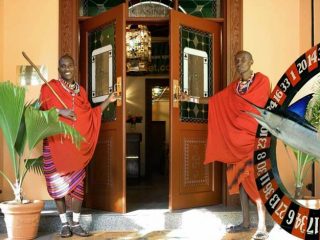 Malindi, a colony of the crime.
Malindi, a colony of the crime.
According to the merciless portrait of the cities mentioned above drafted in 2005 by the US ambassador William Bellamy, ended up in the meat grinder of Wikileaks, Italians have turned Malindi in a piece of Italy traslocandovi their “vices”: exploitation and organized crime.
The shock report Bellamy cited the allegations of corruption against local police baskets by the then Italian console, but it was not at all lenient towards Italians. According to the diplomat, the Italian community has excluded young Africans from work, with the result to drive them to drug trafficking and other illegal activities. Worse, Bellamy also specified that the underworld was actually ruled by the Italians. And that “local authorities are taking advantage of new business to participate in the activity of extortion against the tourists.”
Bellamy reported the case of a Milanese mobster, who arrived in Malindi to rebuild their lives after a conviction in Italy.He also cited other European fugitives who had found impunity in Ibiza of Kenya, as it is called the town. The Italian was by far the biggest drug dealer in the area: in one of his residences were found 700 kilos of cocaine and 300 others had been discovered in a container shipped to Nairobi.
The explosion of the drug business in Kenya, according to the ambassador and many analysts, has helped to increase religious frictions, mixing economic affairs with the social and religious divisions. “All agree that the tensions between the Kenyan communities and the Italians are becoming tensions between Muslims and Christians”, he reflected Bellamy in 2005. The fundamentalists, even then, were proselytes outside mosques in the suburbs inhabited by unemployed youth. The Muslim and Christian gangs faced off on the roadside, and the Christians were increasingly identified as white men associated with the new problems of the country. Seven years later, the tensions between Muslims and Christians have resulted in attacks and bloodshed. The case certainly not isolated commando, composed of groups of dogs loose hooded, assaulting the tourists’ houses holding the machete, they are in fact only a small part of the problem that the Italians have helped create.
See also: Malindi from bad to worse!
November 25, 2015
President Uhuru Kenyatta decided a reshuffle of government, with a change at the top of the Ministries of Energy, Agriculture, Transport and Labour. Kenyatta reiterated that corruption constitutes a “threat to national security.” All replaced ministers -the newspaper The Standard reported- were involved in corruption scandals.
Also the Minister for Devolution, involved in an affair concerning bribes, had resigned denouncing “health problems, caused by the poisonous climate and false allegations” that were moved.
Kenyatta, who was elected in 2013 after having focused on the fight against corruption his campaign, also announced a new legislation providing for the forfeiture of public office in a corruption case and the withdrawal of licenses for banks that did not comply with anti-money laundering standards.
Critics accuse him of failing to keep so far, the promises made and to have only marginally addressed the problem of rampant corruption in all sectors of public administration.
Among the scandals that have affected the Kenyan government, there are a number of related events to land grabbing, cheating on procurement and the inability, on the part of the competent ministers, to explain how about 2.75 billion dollars were spent in Eurobond raised from international markets in 2014. The same Kenyan Armed Forces are at the center of a blizzard, on charges of being involved in a traffic of brown sugar from Somalia, which also provides for an alliance with the insurgents al Shabaab that the army should fight, for a turnover of $ 400 million a year.
Read the following blogs : (When necessary use translators)
Kenya
History of Kenya
History of Malindi
History of Watamu
Zanguebar the land of the Zanj
Kenya from X to XX century
Sultanate of Kilwa
Swahili people
Vasco da Gama
The Malindi Portuguese
The southern sky toward the 1500
Chinese people in Africa
Gedi ruins
The slave trade and slavery
Colonialism in Africa
African Holocaust
Uganda Railway
Mau Mau: extermination
Monotheistic Abrahamic religions
Kenya: peoples, tribes, ethnicities
Masai Tribe
Laibon Olonana Ole Mbatian
Ogiek Tribe
Mijikenda Tribe
Kavirondo Tribe
Bubal Tribe
Kenya: counties, provinces, districts, cities
Nairobi
Kibera, Nairobi
Mathare Valley, Nairobi
Korogocho, Nairobi
Mombasa
Lamu
Kisumu
Nakuru
Ruiru
Eldoret
Pillar tombs and Swahili towns
Historic sites on the Kenyan coast
Most famous monuments in Kenya
The Great Rift Valley
Related Images:
Historic sites on the Kenyan coast
Most famous monuments in Kenya
